CAM
I’m bored stiff with that barmiest of all the widespread forms of alternative medicine, homeopathy. It is clearly heading back to where it was in 1960, a small lunatic fringe of medicine. Nevertheless it’s worth looking at a recent development.
A paper has appeared by that arch defender of all things alternative, George Lewith.
The paper in question is “Homeopathy has clinical benefits in rheumatoid arthritis patients that are attributable to the
consultation process but not the homeopathic remedy: a randomized controlled clinical trial”, Sarah Brien, Laurie Lachance, Phil Prescott, Clare McDermott and George Lewith. [read it here]. It was published in Rheumatology.
Conclusion. Homeopathic consultations but not homeopathic remedies are associated with clinically relevant benefits for patients with active but relatively stable RA.
So yet another case where the homeopathic pills turn out the same as placebos, Hardly surprising since the pills are the same as the placebos, but it’s always good to hear it from someone whose private practice sells homeopathy for money.
The conclusion isn’t actually very novel, because Fisher & Scott (2001) had already found nine years ago that homeopathy was ineffective in reducing the symptoms if joint inflammation in RA. That is Peter Fisher, the Queens’ homeopathic physician, and Clinical Director of the Royal Hospital for Integrated Medicine (recently renamed to remove ‘homeopathy’ from its title). That paper ends with the remarkable statement [download the paper]
- "Over these years we have come to believe that conventional RCTs [randomised controlled trials] are unlikely to capture the possible benefits of homeopathy . . . . It seems more important to define if homeopathists can genuinely control patients’ symptoms and less relevant to have concerns about whether this is due to a ‘genuine’ effect or to influencing the placebo response."
That seemed to me at the time to amount to an admission that it was all ‘placebo effect’, though Fisher continues to deny that this is the case.
"Homeopathy has clinical benefits in rheumatoid arthritis patients" -the title says. But does it?
In fact this is mere spin. What the paper actually shows is that an empathetic consultation has some benefit (and even this is inconsistent). This is hardly surprising, but there is really not the slightest reason to suppose that the benefit, such as it is, has anything whatsoever to do with homeopathy.
Homeopathy, non-specific effects and good medicine is the title of an excellent editorial, in the same issue of Rheumatology, by Edzard Ernst. He points out that "The recognition of the therapeutic value of an empathetic consultation is by no means a new insight". Any therapy that provides only non-specific effects is unacceptable. Any good doctor provides that and, when it exists, real effective treatments too.
Lewith’s private clinic
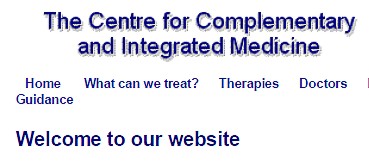
The Centre for Complementary and Integrated Medicine is run by Drs Nick Avery and George Lewith. It is always a bit galling to real scientists, who often work 60 hours a week or more to get results, that people like Lewith get a professorial salary (in his case from the University of Southampton) but still have time to make more money by doing another job at the same time.
Avery is a homeopath. I wonder whether we can now look forward to the web site being changed in the near future so that there is a clear statement that the pills have no effect?
There is, at least, now no longer any mention of the Vega test on Lewith’s site. That is a test for food allergy that has been shown again and again to be fraudulent. The Environmental medicine page is brief, and avoids making any claims at all. It now contains the somewhat coy statement
“Specific food avoidance regimes are a controversial area and one in which there may be conflict between conventionally trained allergists and CAM practitioners.”
However the page about fibromyalgia still mentions homeopathy favourably. And it still fails to refer to my reanalysis of one of the positive trials which revealed a simple statistical mistake.
The front page of their web site boasts that "Dr George Lewith is now one of The Lifestyle 50!". " The Times, in an article on September 6th 2008, included George Lewith in The Lifestyle 50, this newspaper’s listing of the “top 50 people who influence the way we eat, exercise and think about ourselves”. Dr Lewith is included in the Alternatives category". It doesn’t mention that this is an honour he shares with such medical luminaries as Gillian ("I’m not a doctor") McKeith, Jennifer Ariston and the Pope,
But let’s end this on a happier note. There is one thing that I agree with wholeheartedly. Lewith says
"The use of bottled water seems to me to be a multi-billion pound industry, based on some of the cleverest marketing that I have ever encountered. There is absolutely no evidence that bottled water is any safer, better, or more “energising” than the water you get from the tap."
No connection of course with the multi-million pound industry of selling homeopathic water by clever marketing.
Some limitations of the paper by Brien et al.
Like any good trial, this one defined in advance a primary and secondary outcome.
The primary outcome was ACR20. which means the propertion of patients that showed an improvement of at least 20% of the number of tender and swollen joint counts and 20% improvement in 3 of the 5 remaining ACR core set measures (see Felsen 1995). Although it isn’t stressed in the paper, there was no detectable difference between consultation vs no consultation for this primary outcome.
The secondary outcome was 28-joint DAS (DAS-28), tender and swollen joint count, disease severity, pain, weekly patient
and physician GA and pain, and inflammatory markers (see, for example, Stucki. 1996). It was only on this outcome that an effect was seen between consultation and no consultation. The "effect size" (standardized mean score differences, adjusted for baseline differences) was an improvement of 0.7 in DAS-28 score, which runs on a scale from 0 – 10. Although this improvement is probably real (statistically significant), it is barely bigger than improvement of 0.6 which is said to be the smallest change that is clinically significant (Stucki. 1996).
Not only is the improvement by the consultation small in clinical terms. It is also rather inconsistent. for example Table 6 shows that the consultation seemded to result in a detectable effect on swollen joint count, but not on tender joint count. Neither was there any significant effect of the consultation on the response to “considering all the ways your arthritis affects you, please make a vertical line to show how well you are now”. There appeared to be an improvement on “negative mood score”, but not on “positive mood score”. Effects of the consultation on pain scores was marginal at best.
It seems to me that the conclusion that the consultation process helps patients, though not entirely implausible, gets marginal support from this study. It may be real, but if so it isn’t a large effect.
Like most alternative medicine advocates, the authors of this paper make the mistake of confusing caring and curing. Caring is good if there is nothing else that can be done (as is only too often the case). But what patients really want is cures and they’ll never get that from an empathetic consultation.
The problem of Human Resources
What does all this mean for alternative medicine on the NHS? Nobody denies the desirability of empathy. In fact it is now talked about so much that there is a danger that scientific medical education will be marginalised. My own experience of the NHS is that most doctors are quite good at empathy, without any need to resort to hocus pocus like homeopathy and all the myriad forms of mythical medicine.
It must be said that Drs Avery and Lewith have had proper medical training. Their views on alternative medicine seem bizarre to me, but at least they should do no great harm. Sadly, the same can’t be said for the majority of homeopaths who have no medical training and who continue to andanger the public by recommending sugar pills for anything from malaria to Dengue fever. People like that have no place in the NHS. Indeed some are in jail.
Not long ago, I was invited to tour the oncology wards at UCL hospital with their chief spiritual healer, Angie Buxton-King. Although in her private practice she offers some pretty bizarre services like healing humans and animals at a distance, I had the impression that on the wards she did a pretty good job holding hands with people who were nervous about injections and chatting to people in for their third lot of chemotherapy. I asked if she would object to being called a "supportive health care worker" rather than a spiritual healer. Somewhat reluctantly she said that she wouldn’t mind that. But it can’t be done because of the absurd box-ticking mentality of HR departments. There is no job-description for someone who holds hands with patients, and no formal qualifications. On the other hand, if you are sufficiently brainless, you can tick a box for a healer. Once again I wish that HR departments would not hinder academic integrity.
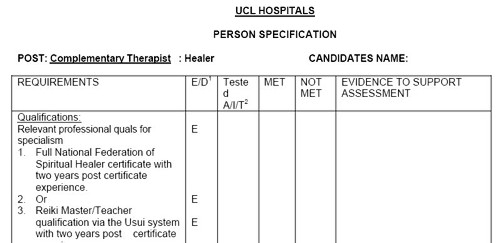
Follow-up
Steven Novella, at Science-Based medicine, has also written about this paper.
The Prince of Wales’ Foundation for Integrated Health shut down amidst scandal in April 2010. In July, we heard that a new “College of Medicine” was to arise from its ashes. It seemed clear from the people involved that the name “College of Medicine” would be deceptive.
Now the College of Medicine has materialised, and it is clear that one’s worst fears were well justified.

At first sight, it looks entirely plausible and well-meaning. Below the logo one reads
“There is a new force in medicine. A force that brings patients, doctors, nurses and other health professionals together, instead of separating them into tribes.”
"That force is the new College of Medicine. Uniquely, it brings doctors and other health professionals together with patients and scientists.”
It is apparent from the outset that the well-meaning words fall into the trap described so clearly by James May (see What ‘holistic’ really means). It fails to distinguish between curing and caring.
As always, the clue lies not in the words, but in the people who are running it.
Who is involved?
After a bit of digging on the web site, you find the names of the people on the Science Council of the “College of Medicine”, The preamble says
“Good medicine must be grounded in good science as well as compassion. The College’s Science Council brings a depth of knowledge from many senior figures.”
But then come the names. With the odd exception the “science council” is like a roll-call of quacks, the dregs left over from the Prince’s Foundation. The link (attached to each name) gives the College’s bio, My links tell a rather different story.
-
Professor George Lewith You’ll find plenty about George Lewith on this blog.
-
Professor Mustafa Djamgoz Superficially respectable but seduced by ‘ancient wisdom’ He once wrote to me "There are many ‘eastern’ remedies (such as acupuncture that we witnessed dismissed 25 year ago) that work. ". Well it isn’t as simple as that.
-
Professor Simon Gibbons A phytochemist with exaggerated ideas of what you can get from plants.
-
Professor Jane Plant A respectable geochemist who became obsessed with alternative medicine, Read about her here,
-
Dr Peter Fisher The Queen’s Homeopathic Physician. Advocate of the most discreded of all forms of quackery. Lots about him here.
-
Dr Michael Loughlin A post-modernist-influenced theorist who hates Ben Goldacre. Read about him here.
-
Dr Hugh MacPherson An acupuncturist and fellow traveller of the Prince of Wales. Read here.
-
Professor Andrew Miles I’m sorry to see him in this company after the good job he did in ejecting quacks at the University of Buckingham.
-
Simon Mills A man who thinks herbs can be classified as "hot"and "cold", See here and here
-
Professor Nicola Robinson Head of the Centre for Complementary Healthcare & Integrated Medicine,Thames Valley University A well known advocate of unevidenced treatments. Try Googling her
-
Dr Catherine Zollman Another hangover from the Princes’ Foundation, and believer in magic medicine
It seems that the "Scientific Council" of the College of Medicine could more properly be called an "Antiscientific Council".
There are a few gaps in this table, to be filled in soon. One can guarantee that a great deal more will appear about the College on the web, very soon.
The Governing Council of the College is equally replete with quacks (plus a few surprising names). It has on it, for example, a spiritual healer (Angie-Buxton King), a homeopath (Christine Glover), a herbalist (Michael McIntyre). Westminster University’s king of woo (David Peters), not to mention the infamous Karol Sikora. Buxton-King offers a remarkable service to heal people or animals at a distance.
Meanwhile, it seemed worthwhile to provide a warning that the title of the College is very deceptive. It hides an agenda that could do much harm.
It is, quite simply, the Prince of Wales by stealth.
Follow-up
28 October 2010
Professor Sir Graeme Catto, who has, disgracefully, allowed his name to be used as president of this “College” has said to me “There are real problems in knowing how to care for folk with chronic conditions and the extent of the evidence base for medicine is pretty limited”.
Yes of course that is quite true. There are many conditions for which medicine can still do little. There is a fascinating discussion to be had about how best to care for them. The answer to that is NOT to bring in spiritual healers and peddlers of sugar pills to deceive patients with their fairy stories. The “College of Medicine” will delay and pervert the sort of discussion that Catto says, rightly, is needed.
29 October 2010
I need a press card. I see that the BMJ also had a piece about the “College of Medicine” yesterday: Prince’s foundation metamorphoses into new College of Medicine, by Nigel Hawkes. He got the main point right there in the title.
As was clear since July, the driving force was Michael Dixon, Devon GP and ex medical director of the Prince’s Foundation. Hawkes goes easy on the homeopaths and spiritual healers, but did spot something that I can’t find on their web site. The “Faculties” will include
“in 2011, neuromusculoskeletal care. Two of the six strong faculty members for this specialty are from the British Chiropractic Association, which sued the author Simon Singh for libel for his disobliging remarks about the evidence base for their interventions.”
The College certainly picks its moment to endorse chiropractic, a subject that is in chaos and disgrace after they lost the Singh affair.
One bit of good news emerges from Hawkes’ piece, There is at least one high profile doubter in the medical establishment, Lord (John) Walton (his 2000 report on CAM was less than blunt, and has been widely misquoted by quacks) is reported as saying, at the opening ceremony
“I’m here as a sceptic, and I’ve just told my former houseman that,” he said. The target of the remark was Donald Irvine, another former GMC president and a member of the new college’s advisory council.”
31 October 2010. I got an email that pointed out a remarkable service offered by a member of College’s Governing Council. Angie Buxton-King, a “spiritual healer” employed by UCLH seems to have another web site, The Beacon of Healing Light that is not mentioned in her biography on the College’s site. Perhaps it should have been because it makes some remarkable claims. The page about distant healing is the most bizarre.
Absent Healing/Distant Healing
"Absent healing is available when it is not possible to visit the patient or it is not possible for the patient to be brought to our healing room. This form of healing has proved to be very successful for humans and animals alike."
"We keep a healing book within our healing room and every night spend time sending healing to all those who have asked for it. We have found that if a picture of the patient is sent to us the healing is more beneficial, we also require a weekly update to monitor any progress or change in the patients situation. Donations are welcome for this service."
I wonder what the Advertising Standards people make of the claim that it is “very successful”? I wonder what the president of the College makes of it? I’ve asked him.
Other blogs about the “College of Medicine”
30 October 2010. Margaret McCartney is always worth reading. As a GP she is at the forefront of medicine. She’s written about the College in The Crisis in Caring and dangerous inference. She’s also provided some information about a "professional member" of the College of Medicine, in ..and on Dr Sam Everington, at the Bromley by Bow Centre….
It is one of the more insulting things about alternative medicine addicts that they claim to be the guardians of caring (as opposed to curing), They are not, and people like McCartney and Michael Baum are excellent examples.
Prince of Wales to become honorary president of the “College of Medicine?”
Last night I heard a rumour that the Prince of Wales is, despite all the earlier denials, to become Honorary President of the “College”. If this is true, it completes the wholesale transformation of the late, unlamented, Prince’s Foundation for Integrated Medicine into this new “College”. Can anybody take it seriously now?
Text messages to Graeme Catto and Michael Dixon, inviting them to deny the rumour, have met with silence.
Herbal nonsense at the College
29 July 2011. I got an email from the College if Medicine [download it]. It contains a lot of fantasy about herbal medicines, sponsered by a company that manufactures them. It is dangeroous and corrupt.
On Friday 25 August 2006, Michael Baum and I went to visit the rather palatial headquarters of the UCL Hospitals Trust (that is part of the NHS, not of UCL). We went to see David Fish, who was, at that time, in charge of specialist hospitals. That included world-leading hospitals like the National Hospital Queen Square, and Great Ormond Street children’s hospital. It also includes that great national embarrassment, the Royal London Homeopathic Hospital (RLHH).
It came as something of a surprise that the man in charge did not know the barmy postulates of homeopathy and he looked appropriately embarrassed when we told him.
Michael Baum is not only a cancer surgeon. but he has also taken the lead in thinking about palliative and spiritual needs of patients who suffer from cancer. Listen to his Samuel gee lecture: it is awe-inspiring. It is available in video, Concepts of Holism in Orthodox and Alternative Medicine.
The problem for UCLH Trust is that the RLHH has royal patronage One can imagine the frantic green-ink letters that would emanate form the Quacktitioner Royal, if it were to be shut down. Instead, we suggested that the name of the RLHH should be changed. Perhaps something like Hospital for palliative and supportive care? Well, four years later it has been changed, but the outcome is not at all satisfactory. From September it is to be known as the Royal London Hospital for Integrated Medicine.
What’s wrong with that? You have to ask what is to be "integrated" with what?. In practice it usually means integrating things that don’t work with things that do. So not much advance there. In fact the weasel word "integrated" is just the latest in a series of euphemisms for quackery. First it was ‘alternative’ medicine. But that sounds a bit ‘new age’ (it is), so then it was rebranded ‘complementary medicine’. That sounds a bit more respectable. Now it is often "integrated medicine" (in the USA, "integrative"). That makes it sound as though it is already accepted. It is intended to deceive. See, for example, Prince of Wales Foundation for magic medicine: spin on the meaning of ‘integrated’, and What ‘holistic’ really means.
Of course the amount of homeopathy practised at the RLHH has fallen considerably over the last few years. Already by 2007 there were signs of panic among homeopaths, They are beginning to realise that the game is up. Some of the gaps were filled with other sorts of unproven and disproved medicine.
What the hospital is called matters less than what they do, The current activities can be seen on the UCLH web site.
Services:
- Allergy Environmental and Nutritional Medicine
- Autogenics Training
- Children’s Clinic
- Complementary Cancer Care Programme
- Education services
- Musculoskeletal Medicine Clinic
- Pharmacy Services
- Skin Services
- Stress and Mood Disorders Clinic
- The Marigold Clinic – Homeopathic Podiatry and Chiropody
- Womens Clinic
It would be tedious to go through all of them, but here are some samples.
The Children’s Clinic
"The mainstay of treatments offered include Homeopathy, Herbal remedies, Flower essences, Essential oils, Tissue salts and Acupuncture. We also assess nutritional status, provide dietary advice and supplementation. Psychotherapeutic techniques including Neuro-Linguistic Programming (NLP), and Visualisation are sometimes used where indicated, to gain better understanding of the presenting problems".
So a wide range of woo there. And they claim to be able to treat some potentially serious problems
"What can be treated
A wide variety of clinical conditions are being treated including:
- Recurrent infections
- Skin diseases such as eczema
- Allergic disorders including asthma
- Food intolerances and eating disorders
- Functional developmental and learning problems
- Behavioural disorders including ADHD (hyperactivity) and autism."
There is, of course, no evidence worth mentioning thar any of these conditions can be treated effectively by “Homeopathy, Herbal remedies, Flower essences, Essential oils, Tissue salts and Acupuncture”.
They describe their success rate thus:
An internal audit questionnaire showed that 70% of children responded well to homeopathic treatment
So, no published data, and no control group. This is insulting to any patient with half a brain.
These claims should be referred to the Advertising Standards Authority and/or Trading standards. They are almost certainly illegal under the Consumer Protection Regulations (May 2008). The UCLH Trust should be ashamed of itself.
Education Services offers mainly courses in homeopathy, the medicines that contain no medicine,
Pharmacy Services stock thousands of bottles of pills, most of which are identical sugar pills. It’s hard to imagine a greater waste of money.
The Marigold Clinic – Homeopathic Podiatry and Chiropody
I was rather surprised to find this is still running. In 2006, I wrote about it in Conflicts of interest at the Homeopathic Hospital. It turned out that the prescription costs if the clinic were spent on Marigold paste, made by a company owned by the people who run the clinic. UCLH claimed that they were aware of this conflict of interest, but had no obligation to make it public. That is an odd ethics in itself. Even odder when I discovered that the Trust had been notified of the conflict of interest only after I’d started to ask questions.
The same people are still running the clinic. They may well be good chiropodists, If so why surround the service with woo. There are, almost needless to say, no good trials of the efficacy of marigold paste (and it isn’t homeopathic).
Conclusion
At the moment, it appears that the renaming of the RLHH is empty re-branding. No doubt UCLH Trust see homeopathy as something that brings shame on a modern medical service. But to remove the name while retaining the nonsense is simply dishonest. Let’s hope that the name change will be followed by real changes in the sort of medicine practised, Changes to real medicine, one hopes.
Other blogs on this topic
Gimpyblog was first, with Farewell to the RLHH, hello to the RLHIM
Quackometer posted An Obituary: Royal London Homeopathic Hospital, 1849-2010
Follow-up
Systems biology is all the rage, No surprise then, to see the University of Westminster advertising a job for a systems biologist in the The Department of Molecular and Applied Biosciences. Well, no surprise there -until you read the small print.
Much has been wriiten here about the University of Westminster, which remains the biggest provider of junk sciencne degrees in the UK, despite having closed two of them.
Senior Lecturer in Systems BiologyUniversity of Westminster – Department of Molecular and Applied Biosciences, School of Life SciencesCavendish Site Salary £37,886 – £50,751 (Inc. LWA) The Department of Molecular and Applied Biosciences wishes to appoint a Senior Lecturer in Systems Biology. The post-holder will teach on the undergraduate and postgraduate degree programmes within the School of Life Sciences, particularly in the areas of Molecular Biology, Bioinformatics and/or statistics, establish their own and participate in ongoing research programmes and undertake external income generation activities. The candidate should have an active interest in bridging the gap between western life sciences and Chinese medicine using emerging systems biology approaches, specifically in metabolomics and proteomics with a goal of developing novel diagnostic technologies facilitating the creation of a personalised approach to medical care. They should therefore be willing to work closely with colleagues in the life sciences as well as with clinicians and clinical researchers from within the East Asian medical tradition. The post is available from 1st October 2010 or as soon as possible thereafter. The closing date for applications, together with a short statement on why you believe you are suitable for the position and a description of your research plans, is Monday 6th September 2010. Interviews are expected to be held later in September. Administrative contact (for queries only): Tayjal Tailor (t.tailor1@wmin.ac.uk) Reference Number: 50000360 Closing Date: Friday 3 September 2010 |
A note about systems biology
Systems biology is about about how whole organs behave, as opposed to single cells or single molecules, It has to be the ultimate aim of biology. There is one case in which this has been done with some success, That is the modelling of the behaviour of the whole heart by Denis Noble and his colleagues in the Phyiology department (now gone) in Oxford. They adopted a bottom up approach. They measured the currents that flow though many sorts of ion channels in single cells from various parts of the heart, and how individual cells communicate with each other. Starting from this solid basis, together with a lot of computer power, they were able to model successfully a lot of phenomena that occur in the whole heart, but can’t be investigated in single cells. For example their work cast light on abnormal heart rhythms like ventricular fibrillation, and on the effect of drugs on heart rhythm.
This work was mostly done before the term ‘systems biology" thought of. It was called physiology. It is impressive work, and systems biology became a fashionable buzzword among research administrators and funding agencies. Despite the amount of money thrown at the problem, I’m not aware of any success that remotely approaches Noble’s.. One reason for that is that people have not been willing to put in the groundwork. In the case of the heart, the models were built on -many years of basic research on the electrophysiology of single heart cells. People have tried to model from the top down, without doing the spade work first. There has developed a perception that computing power can compensate for lack of basic knowledge about things work. It can’t. The usual aphorism applies: garbage in, garbage out.
Here’s an example, which eas noted in the diary pages for 29 June, 2008. While in Edinbuurgh, to give a talk to the European Conference on Mathematical and Theoretical Biology, I noticed a poster. It described an attempt to model on a computer the entire metabolic network of yeast.
“81 of the 662 intracellular concentrations were defined . . . The remainder were set to the median concentration of c. 0.2 mM.”
Ahem. We didn’t know the concentrations so we just made them up so we could run the program.
It’s interesting that even people in the business seem to realise that even that it isn’t living up to the hype. The Fixing proteomics web site shows why.
Put another way, if you try to run before you can walk, you risk falling falling on your face.
For these reasons, it seems to me that that most attempts at system biology have been disappointing (please correct me if I’m wrong)
Systems biology for Chinese medicine
If systems biology suffers from trying to run before it can walk in regular biology, where at least something is known about the functions of cells, how much more true that must be of Chinese medicine. In Chinese medicine almost all the treatments have never been tested properly in man. The odds are that most don’t work at all, and some are very poisonous (not to mention the cruelty and destruction of endangered species that is involved in making some of their more bizarre medicines). The idea that you can explain it with systems biology, is ludicrous in the extreme.
One can’t imagine any vaguely competent biologist who’d want to touch a project as bizarre as this with a bargepole.
Eastmedicine
This advertisement stems presumably from EASTmedicine is the University of Westminster’s research centre for East Asian Sciences and Traditions in Medicine. The proclaimed aims are to focus on “understanding, development and evaluation of East Asian medicines as living traditions”. The director of EASTmedicine, Volker Scheid, is a herbalist and acupuncturist and, as such, a firm believer in alternative medicine. When he isn’t at the University he has a private practice, the Traditional Acupuncture Centre, in London.
The website of his private practice makes some astonishing claims
"Acupuncture is effective in the treatment of numerous conditions including headache, migraine, digestive problems, menstrual disorders, indeterminate aches and pains, asthma, hayfever, stress, tiredness, depression and anxiety. Also commonly treated are chronic conditions such as arthritis, back pain, ulcerative colitis, irritable bowel syndrome, eczema, sinusitis, high blood pressure and repetitive strain injuries."
These claims simply cannot be justified by any worthwhile evidence. It will be interesting to see what Trading Standards make of them.
Dr Scheid describes himself as a "scholar physician". Physician seems a rather pretentious description for someone whose qualifications are stated to be PhD, MBAcC, FRCHM. But in similar vein he describes himself thus "I am one of the West’s leading experts on Chinese medical formulas and treatment strategies".
Although Scheid sells acupuncture treatments to patients, he seems ro be more anthropologist than medical. In a discussion of two acupuncture papers
"From the Perspective of the Anthropologist –
Volker Scheid, London, UK
From a perspective anchored in the cultural studies of science, technology and medicine my main interest in these papers is their status as cultural artifacts that provide access to the lifeworlds of a particular research community. If any, life-world debate and argument marks sites of contestation." Forsch Komplementärmed 2007;14:371–375
Scheid shows not the slightest interest in whether acupuncture works other than as a placebo. Since he is selling acupuncture, he presumably starts from the premise that it works.
Volker Scheid has had a £205,000 Wellcome Trust for the History of Medicine Project Grant: 2009 2012; Treating the Liver: Towards a Transnational History of East Asian Medicine; There’s nothing wrong with writing the history of long-outdated systems of medicine, though one could hardly imagine that the history would be very impartial, when it is written by a true believer. Another taste of his style can be found in his paper on Globalising Chinese Medical Understandings of Menopause. There is lots of rather pretentious stuff about culture, but very little about what actually works, Towards the end of the paper we come to the usual feeble excuse.
" . . once traditional medicines allow themselves to be evaluated by biomedical research methods, the odds against receiving fair treatment are heavily stacked against them."
The translation of that into plain English is something like ‘when we test our treatments properly we find they don’t work, so we blame the methods and carry on with selling them anyway’.
Judging from its web site, EASTmedicine does not to do any serious clinical trials to test whether the treaments work in man, They just know that they do. But they are hoping to add some spurious scientific background to their dubious claims by hiring someone to do compuations that will cast no light whatsoever on the question that really matters, Do they work or not?
The agenda is made clear by the statement
EASTmedicine seeks to describe and analyse the dynamics of these transformations with a specific view of managing their integration into contemporary health care.
So it is just yet another group of people pushing to have unproven and disproved treatments accepted by real medicine.
The University of Westminster appears to be determined to make itself the laughing stock by persisting in promoting junk science at a time when most other universities have realise that the harm done to their reputations is not worth the income it generates, Plenty of it has been revealed here.
The vice-chancellor of Westminster, Prof Geoffrey Petts, made into the pages of Private Eye (see Crystal balls. Professor Petts in Private Eye when he announced that he wouldn’t get rid of the junk, but would make it more ‘scientific’. Well, credit where it’s due, They have dropped homeopathy. see The last BSc (Hons) Homeopathy closes! But look at what they still teach at Westminster University For 2010 they still off ten different “BSc (Hons)” degrees in pre-scientific forms of medicine. It will take more than a bit od talk about systems biology to make anyone believe that these courses have anything to do with science.
For example, look at some slides from their lectures on “energy medicine”, Westminster University BSc: “amethysts emit high yin energy”
More make-believe from the University of Westminster. This time it’s Naturopathy , or
Why degrees in Chinese medicine are a danger to patients
The Dean of the School of the Life Sciences, Jane Lewis, is an entirely respectable marine biologist. She has had the thankless task of merging the real science with the alternative medicine in a single school. I phoned her to get a reaction
" outcome of merger of the school and trying to bring various parts of the school together" " "things are much more rigorous than they were".
DC: "Why don’t you just phase it out?"
"I’m not in a poition to do that. i move things forward as seems best -for the whole school I have to say". We’re retaining those bits thatI think have some good standing -I see NICE has approved the use of acupuncture for lower back pain and some other bits and pieces so I see acupuncture as something that does have some standing, andwe make sure it rigorously taught"
"DCHave you looked at the stuff on naturopathy?" "Are amethysts emit high Yin energy still taught?" " i don’t think so".
It seems, as so often in this case, that the senior people don’t really know what’s being taught under their noses. Prof
Lewis says she has not read about the background
to the (unusually) daft advice from NICE. Neither has she read Barker Bausell’s book on acupuncture research. If she had done any of these things,I suspect she would not have such a high opinion of it as appears to be the case.
Bait and switch. Astonishingly there is a now a whole organisation devoted to the respectabalisation of Traditional Chinese Medicine Good Practice in Traditional Chinese Medicine Research in the Post-genomic Era It sounds nice and sciencey but, as usual, they are trying to run before they can walk. The first thing has to be to do good clinical trials to find out if there is anything there to be investigated. If, and only if, this is the case, would there be any case for fancy talk about "proteomics"
and "the post-genomic era".
I do hope that no funding agency would be fooled into parting with money on the basis of the present vacuous rhetoric.
Professor Lewis said that I have I have quoted things like "amethysts emit high Yin energy" out of context. There is a simple solution to that. I have asked Westminster to make available the entire contents of the courses. Then we shall all be able to see the context of what their sudents are being taught.
Follow up
A brief report of this matter has appeared in Times Higher Education. In a statement, the University of Westminster says “its research into Chinese medicine is following the lead of “top research institutions”. I’m not aware of anyhting quite like this from anywhere else. In any case, Westminster should be able to think for themselves.
Having recently been fired from Ofquack, the Complementary and Natural Healthcare Council (CNHC). I found I was missing the constant dribble of double-speak, Then, as luck would have it, a friend emailed me to draw my attention to a lucrative job at Ninewells Hospital, Dundee. On August 11th I put out a tweet, just in case any of my friends were interested.
How to save money. NHS Scorland (Tayside) advertises for homeopathic doctor http://bit.ly/9Ou9Yo Pathetic #fail
After the story appeared in the Daily Express it occurred to me that I should apply. It seems that NHS Scotland
Tayside) is determined to look idiotic in the eyes of the world. They advertised for a homeopathic doctor, The upper level of salary, £68,000 for two sessions a week, is a great deal more than I ever got paid as holder of the established chair of pharmacology at UCL, Then I discovered that a crystallographer, David Briggs (@xtaldave on twitter) had applied for the job. If he can, why not I? I found it hard to match the wit of his supporting statement, but just in case others want to apply, here’s my attempt. The more the merrier.
.
|
As a Fellow of the Royal Society for the last 25 years, and author of a textbook on statistics, I feel sure that I am capable of dealing with the intellectual rigours of handing out placebos to patients. I feel that my academic qualifications, and my authorship of many research papers, including several articles about homeopathy, should more than make up for my lack of formal qualifications in medicine or homeopathy. Indeed I have spent more time than I care to remember on reading the extensive literature on homeopathy. Having some expertise in the statistical analysis of clinical trials, my reading of the literature has equipped me well to impress gullible patients with sciencey sounding words like “succussion”, “energy medicine” and “quantum theory”. As an additional qualification, I have read widely about crystal healing, magnetic bracelets, aura photography and other such fairground paraphernalia which are designed, like homeopathy, to impress those with no knowledge of science or medicine. I have had over two years’ experience of serving on the Conduct and Competence Committee of the Complementary and Natural Healthcare Council, which has provided me with valuable insights into the world of alternative medicine. Indeed I have been told that my name is well known in Clarence House itself. If appointed to this job, I should like to combine it with research in homeopathy. I would approach this by using systems biology, in the hope that proteomics and metabolomics would be able to explain the still mysterious ability of medicines that contain no medicine to satisfy patients. People whom I know at the University of Westminster have proposed to use systems biology to explain Traditional Chinese Medicine, and I imagine that its application to homeopathy will be every bit as successful as theirs. To have cutting edge research of this sort will, I believe, give NHS Scotland a reputation that will spread around the world. I would also propose to save the Tayside PCT a lot of money, something not to be ignored in these hard times. At present, homeopathic pharmacies stock many thousands of sorts of pill. Recognising that the majority of them contain nothing at all, I’d retain the labels but fill all the bottles with sugar pills. This would save huge amounts of time and money, while having no effect at all on the outcome for patients. Despite my lack of formal qualifications, I hope you will agree that I’m qualified intellectually to meet the rigours of your job. |
Follow-up
I was not the only person to follow the example of David Briggs (@xtaldave). So far I’ve seen Dean Burnett (@garboy) on Science Digestive, Peter Harrison on Reality is My Religion, and Torgwen.
Three days on, there are at least eleven applications, and the three earliest ones have been read something like 12.000 times.
18 August 2010. Astonished to receive by snail-mail a straight-faced acknowledgment of my application from NHS Tayside [download pdf]. They ask me to send four copies of my CV and fill in forms for Equal Opportunities and Fitness to Practise. Does this mean I’ve been short-listed? This gets more surreal by the minute.
|
Yesterday I was fired from the Conduct and Competence Committee of the CNHC. That is the organisation that was very quickly dubbed Ofquack in the blogosphere. So now I am free to write what I like about about it. |
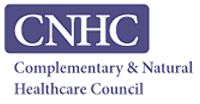
|
It has now become clear that voluntary self-regulation can not work. Recent events at the CNHC show how it has become a victim of its own rules [skip the background].
Background | Complaints | Why CNHC won’t work |
Background
The CNHC was the product of the late unlamented Prince of Wales’ Foundation for Integrated Health. The Prince’s Foundation was paid a large amount of taxpayers’ money, £900,000, by the Department of Health to come up with a scheme for voluntary self-regulation of various sorts of alternative medicine.
There is, as usual, an enormous amount of relevant information can be found on the ebm-first site.
I posted a bit about Ofquack just before I joined them. There were two main points. One was to draw attention to the wonderful account of CNHC by Polly Toynbee, "Quackery and superstition – available soon on the NHS", The other was to point out an obvious problem with the job they were supposed to do.
“What won’t work is to insist that homeopaths are “properly trained”. If one takes the view that medicines that contain no medicine can’t work, then years of being trained to say that they do work, and years spent memorizing the early 19th century mumbo-jumbo of homeopathy, does not protect the public, it imperils them.”
On 25 September 2008, someone sent me an advertisement for a job on the conduct and competence committee. The job description seemed to fit me quite well, so I applied. I presumed they wouldn’t take me, and then I could write a blog about it. But after a phone interview with co-chair Maggy Wallace, I was amazed to be offered the job.
Since joining them I haven’t actually done anything whatsoever, apart from offering a few general ideas, because no cases have actually reached the Conduct and Competence Committee.
This was the first time I had encountered a quango at first hand. Several of the members seemed to have no great interest in medicine, or even in alternative medicine. They were more interested in regulation per se, or at least the sort of pseudo-regulation that most of these bodies mostly seem to offer. They seem to suffer from the well-known delusion that you can manage/regulate something without knowing anything about it. In cases such as this one, where what is being regulated is largely nonsense, there are bound to be problems.
There were two people, whom I did come to like particularly, Maggy Wallace and John Lant. They were both willing to talk and to listen.
The anonymous emails
The alternative medicine community took a surprisingly long time to notice my presence, but on 19 May 2010 a pretty vicious anonymous email arrived at the CNHC, complaining about me. Here it is.
|
Received: from exprod8mo105.postini.com ([64.18.3.61]) by cnhc.org.uk with Microsoft SMTPSVC(6.0.3790.4675); Wed, 19 May 2010 10:45:24 +0100 Received: from exprod8mc102.postini.com (exprod8mc102.postini.com [64.18.3.241]) by exprod8mo105.postini.com (Postfix) with SMTP id D80135A8726 for <info@cnhc.org.uk>; Wed, 19 May 2010 02:45:23 -0700 (PDT) Received: from source ([72.14.220.155]) by exprod8mx290.postini.com ([64.18.7.10]) with SMTP; Tue, 18 May 2010 08:56:11 MDT MIME-Version: 1.0 Return-Path: <colquhounalertcnhc@gmail.com> X-OriginalArrivalTime: 19 May 2010 09:45:25.0002 (UTC) FILETIME=[019176A0:01CAF738]
Thread-Topic: CNHC and Colquhoun
From: “Sara McGlouglan” <colquhounalertcnhc@gmail.com> Colquhoun and the CNHC (Complementary and Natural Health Care Council) What is the CNHC and why does it exist? REFLEXOLOGY IS BOLLOCKS! Nutritional therapy self-styled ‘nutritionists’; making untrue claims about diet in order to sell you unnecessary supplements. Reiki: tea and sympathy, accompanied by arm-waving. Shiatsu uh? It seems the teacher is already committed to placebo medicine. [All the above quotes; and many more stated by David Colquhoun, CNHC Panel member] Contents 1: Colquhoun and CNHC 2: More statements from Colquhoun 3: Want some more!!! 4: What to do 1. Colquhoun and CNHC Colquhoun is a man who has steadfastly attacked, denigrated and taken all steps he can to undermine those involved in natural health. Yet Colquhoun is now (and has been for more than a year) a member of the CNHC’s Conduct and Competence Committee. The role of CNHC is to regulate the professions of their members. But what is the rational behind allowing an avowed critic of natural medicine onto the Conduct and Competence Committee. Isn’t this like asking racist to be objective about the circumstances of racist crime? Would you, as a practitioner having to answer to a complaint, be happy to have one of the panel members think your profession is ‘bollocks’ or that everything you practice is fraudulent from the start? Latest moves from the government now aim at putting all Herbal Practitioners under the authority of CNHC. Do you want your personal and confidential data, and that of your patient/client in the hands of Colquhoun? What might happen to it? Certainly every practitioner has to be responsible for their actions and practice but since when has it been standard practice to weigh the scales against you rather than be assessed by a panel of independent peers? 2. More statements by Colquhoun ‘ nonsense, untrue, unnecessary, rectal obsession, mystic barmpot, fraud, theatrical placebo‘ In his "Patients’ guide to Magic medicine” [https://www.dcscience.net/?page_id=733] Colquhoun summarizes many of the CNHC members’ professional activities (and other professions too) as follows: * Reflexology: plain old foot massage, overlaid with utter nonsense about non-existent connections between your feet and your thyroid gland. * Nutritional therapy: self-styled ‘nutritionists’ making untrue claims about diet in order to sell you unnecessary supplements. * Spiritual healing: tea and sympathy, accompanied by arm-waving. * Reiki: ditto. * Angelic Reiki. The same but with added Angels, Ascended Masters and Galactic Healers. Excellent for advanced fantasists. * Colonic irrigation: a rectal obsession that fails to rid you of toxins which you didn’t have in the first place. * Anthroposophical medicine: followers of the mystic barmpot, Rudolf Steiner, for whom nothing whatsoever seems to strain credulity * Alternative diagnosis: kinesiology, iridology, vega test etc, various forms of fraud, designed to sell you cures that don’t work; for problems you haven’t got. * Homeopathy: giving patients medicines that contain no medicine whatsoever. * Herbal medicine: giving patients an unknown dose of an ill-defined drug, of unknown effectiveness and unknown safety. * Acupuncture: a rather theatrical placebo, with no real therapeutic benefit in most if not all cases. So what kind of organisation is CNHC and why have they put him on to their Conduct and Competence panel? Being a CNHC member seems to be like inflicting pain on yourself. CNHC also received funding from the Prince’s Foundation for Integrated Health (FIH). Yet Colquhoun regularly lambasts the FIH and Prince Charles himself categorizing him as a ‘champion of endarkenment’ [https://www.dcscience.net/?p=2544] and calling the FIH the Foundation Fellows of the Prince of Wales Foundation for Magic Medicine, an organisation that is at the forefront of spreading medical misinformation. [https://www.dcscience.net/?p=2131] Of course, no one expects that because an organisation provides funding it should be exempt from criticism but surely, if you are working for an organisation whose purpose is to represent standards in a certain field, why would you have someone on your management team who fires out carping criticism at the supporting organisation, its practitioners and its practices unless perhaps, it is your purpose to spread discord and cut the funding. No wonder the CNHC has problems. Their business plan (contingent on funding) was initially to have more than 10,000 enrolled members. This has been revised down to 2,000 and by all counts they have not even made this. Not surprising if the practitioners whom you represent don’t have any trust in the organisation that is supposed to represent the standards of your profession. 3. Want some more!!! fantasists, wrong and dangerous, largely quackery, lies, mumbo-jumbo, made-up fantasies, placebo medicine On nutritional therapy It is interesting to compare the high standards of the Nutrition Society with the quite different standards of BANT (the British Association for Applied Nutrition and Nutritional Therapy).& They bill themselves as the “Professional Body for Nutritional Therapists”. Nutritional therapists are those fantasists who believe you can cure any ill by buying some supplement pills. [https://www.dcscience.net/?p=1391] [On quotes taken from Nutritional Therapy text] That must be about as close as you can get to claiming you can prevent cancer by taking vitamin pills. It is wrong and t is dangerous, Sigh. What century are we living in? [https://www.dcscience.net/?p=555] Everyone is for good nutrition of course, but ‘nutritional medicine’, or ‘nutritional therapy’ pretends to be able to cure all sorts of diseases by changes in diet or by buying expensive nutritional supplement pills. It has no perceptible relationship to the very important subjects of ‘nutrition’ or ‘dietetics’.. ‘Nutritional therapy’ is very firmly part of alternative medicine, in other words it is largely quackery. If you don’t believe that, read on. https://www.dcscience.net/?p=260 On Reflexology As usual, not many seemed to care very much about the secondary consequences of employing a ‘reflexologist’, namely that some poor kid has to memorise a bunch of lies to get the piece of paper demanded by HR (and the taxpayer has to fund it). https://www.dcscience.net/?page_id=237 What is the evidence about ‘spiritual healing’ ? Very little it seems. No doubt, mumbo-jumbo can make some people feel better, and to that extent it is justified. But it can and should done be honestly (for example, foot massage is fine, ‘reflexology’ isn’t). Lies to patients should be minimised and universities should not be tempted to hand out certificates in mumbo jumbo. https://www.dcscience.net/?p=34 Michael McIntyre has the first of several long speeches, advocating more research. There was an advertisement for his web site “promotes best practice” (allegedly). He talks quite seriously about “reflexology” and so on, as though it were real subject (it isn’t; its “principles” are made-up fantasies). https://www.dcscience.net/?p=2813 Much of what they do at the Christie is straightforward massage, but they also promote the nonsensical principles of ‘reflexology’ and acupuncture. https://www.dcscience.net/?p=1466 The hilarious Radio 4 programme, The News Quiz had a good joke. Jeremy Hardy was asked which patients are hoping for a more robust constitution?. This referred to the £1m PR exercise mounted by the NHS to launch the NHS constitution. Hardy said that in the week when Barack Obama was inaugurated, and the word constitution have a whole different sort of gravitas in a week like that. "I think the constitution should open with the words “We hold these truths to be self-evident REFLEXOLOGY IS BOLLOCKS" https://www.dcscience.net/?page_id=237 On Shiatsu Shiatsu uh? It seems the teacher is already committed to placebo medicine. https://www.dcscience.net/?p=454 4. What to do Why join an association that condones the above? Many have never joined CNHC because of this and other issues whilst existing CNHC members do not want to remain members. 1. Contact your professional association and insist that they do not join CNHC. 2. If your association is already a member then make a complaint and insist that your personal details are not supplied to CNHC. 3. There are other associations in existence that have the same purpose as CNHC. Find out about them. You (or your professional association) have the option to join them and 4. Please pass on this information to anyone else that you know. It is important that we are represented honestly and with integrity. The actions of CNHC do not add up. ooOOoo |
Nobody seems to know the real name of Sara Glougan (aka Sam McGlougan. The letter is, I suppose, fair enough. I did say most of those things. What’s objectionable is that the anonymous writer seems to think that my opinions disqualify me from judging dispassionately a Conduct and Competence case. What this letter really says is that "we don’t want anyone who cares about the truth of claims to have any power over us". They just don’t want to be regulated in any effective way. The co-chair, Maggy Wallace, is a bit more sensible than that. The reason that I was appointed by her was because of my knowledge about how to assess evidence. But that isn’t a topic that interests alternative medicine advocates.
The fact of the matter is that the CNHC has been signing up people at a far slower rate than it hoped originally. It is in dire financial trouble (see, for example, Will the government bail out Ofquack?>, and CNHC’s report to the Department of Health in June 2009, obtained under the Freedom of Information Act.. The last thing they can afford is anything like this letter, which might reduce the registration rate still further. So it was inevitable that they had to get rid of me. Initially I was invited to resign on grounds of bad health. I didn’t, so on 10 August 2010 I was asked to appear before the board to be fired (in the nicest possible way). The CNHC now has nobody with any statistical expertise. Needless to say I’m not heartbroken about it. It was a waste of time for me, but it did provide a valuable insight into how voluntary self-regulation works, or rather fails to work.
The complaints against reflexologists
The CNHC has a complaints procedure, though its operation is somewhat tortuous.. As soon as they started to register reflexologists, several complaints were sent by the indefatigable Simon Perry (read his account)
“The ad suggests that reflexology is suitable for treating babies with colic, IBS and arthritis. She also claims to have experience in treating fertility issues. There is no reliable evidence to suggest that reflexology is capable of treating [these] issues.”
This complaint never came to to the Conduct and Competence Committee. It didn’t get past the preliminary Investigating Committee (chaired by John Lant), the job of which is to see if there is a case to answer. They decided that the advertisements in question did indeed breach paragraph 15 of the CNHC’s Code of Conduct, Performance and Ethics (see below). All 14 of Simon Perry’s complaints were upheld. However the Investigating Committee Panel’s report went on to say, apparently on the advice of the ‘Profession specific boards’ that
“The ICP found that the registrants’ Fitness to Practise was not impaired, because they did not deliberately seek to mislead their clients or to exaggerate the benefits of the therapy which they described in good faith. However they found that the registrants had made claims about the therapy offered which appeared to imply more efficacy than evidence necessarily provides.”
That, presumably, is why the complaints never reached the Conduct and Competence Committee. There was no case to answer.
One must admire Maggy Wallace’s statement that she “place on formal record their thanks to Simon Perry for bringing this matter to their attention.”. Never the less the problem is glaringly obvious and it shouldn’t have need a complaint.
Why ofquack can never work
The complaint episode is fascinating. The CNHC has clearly painted itself into a corner. It has brought to the fore all the contradictions that are inherent in what they are trying to do.
They have decided that reflexologists make false claims about what they can achieve.
But they decided it wasn’t the fault of the reflexologists because that is what they had been taught
Therefore the CNHC has judged that fitness of reflexologists to practise is not affected by the fact that they make false health claims.
That means that the CNHC judges that the public safety is not affected by whether their members make false health claims. That seems ludicrous enough, but it goes further
In the initial publicity it was often said that the job of the CNHC was safety -their job to protect the public, not to judge whether treatments worked or not. That sort of statement is contradicted directly by paragraph 15 of their Code of Conduct, Performance and Ethics, which reads thus.
15. You must follow CNHC guidelines in relation to advertising your services
Any advertising you undertake in relation to your professional activities must be accurate. Advertisements must not be misleading, false, unfair or exaggerated. You must not claim that your personal skills, equipment or facilities are better than anyone else’s.
If you are involved in advertising or promoting any other product or service, you must make sure that you use your knowledge, healthcare skills, qualifications and experience in an accurate and professionally responsible way. You must not make or support unjustifiable statements relating to particular products or services. Any potential financial rewards to you should be made explicit and play no part at all in your advice or recommendations of products and services that you give to patients, clients and users.
This paragraph places on the CNHC the responsibility for judging whether or not a treatment does what’s claimed for it. With my departure, there is really nobody left who is well-qualified to do that,
but nonetheless, their judgement on claims made by reflexologists was quite right.
The assertion by the CNHC that the false claims were OK because that is what reflexologists are taught is a direct admission that the courses that ‘train’ reflexologists are teaching them to say things that are not true. Of course the rest of the world knew that already, but to have it admitted by the CNHC is amazing.
Part of the job of the CNHC is to judge whether registrants are properly trained. But they have just decided that courses for reflexologists teach them to say things that aren’t true, That leaves the CNHC it an impossible position. By accepting reflexologists, they are saying that it doesn’t really matter that they are taught to make false claims, The criteria for entry include
“Have undertaken a programme of education and training which meets, as a minimum, the National Occupational Standards for that profession/discipline”
This shifts the responsibility for deciding what’s acceptable to National Occupational Standards and Skills for Health. Neither of these quangos is in the least concerned about what’s true and what isn’t. That’s not surprising when you realise who drafted all the HR style nonsense to be found at Skills for Health? None other than the late Prince of Wales’ Foundation. The stuff produced by them isn’t worth the paper it’s written on. There is something about Skills for Health in the post where I recount a phone call with them, When I asked whether they would produce standards for talking to trees, I was referred, in all seriousness, to LANTRA, the Land based skills council. You couldn’t make it up.
The National Occupational Standards (NOS) directory leads to the NOS for reflexology. The preamble says
Reflexology is the study and practice of treating reflex points and areas in the feet and hands that relate to corresponding parts of the body. Using precise hand and finger techniques a reflexologist can improve circulation, induce relaxation and enable homeostasis. These three outcomes can activate the body’s own healing systems to heal and prevent ill health.
There is, if course, not a shred of reason to think that “areas in the feet and hands that relate to corresponding parts of the body”. This statement alone would fail the CNHC’s code of conduct. National Occupational Standards in this area are simply a farce.
What will the CNHC do about these paradoxes? The complaint report said
“The ICP have asked Maggie Dunn, the CNHC Registrar, to initiate, as a matter of priority, discussions with the CNHC’s Profession Specific Boards and the Professional Fora to agree advice to registrants in relation to paragraph 15.”
I was told that this might take between 3 and 5 years to do. But I have a strong feeling that it will never be done in any effective way. If the CNHC prevented training courses from teaching students to make claims that aren’t justified by evidence, just about every course would close and the CNHC would crumble to dust. The result would be the ultimate irony. Alternative medicine would be abolished, not by skeptics, but by the CNHC.
That follows inevitably from the complaint judgement combined with paragraph 15 of the code of conduct.
It will be fascinating to see how the CNHC tries to escape from the grave that it has dug for itself.
If the CNHC implements properly its own code of conduct, few people will sign up and CNHC will die. If it fails to implement its own code of conduct it would be shown to be a dishonest sham.
Follow-up
Interview for Pod Delusion on the CNHC case
Suggested twitter tag: #buckgate
|
Number 19 Buckingham Street, London WC2N 6EF.is to be the home of the proposed "College of Medicine" that has arisen from the ashes of the late unlamented Prince’s Foundation for Integrated Health (their last accounts can be seen at Quackometer). Naturally one must ask if the "College of Medicine" will propagate the same sort of barmy ideas as the Prince’s Foundation used to do, A visit to Companies House shows the auguries are not good |
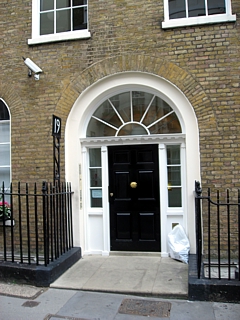 19 Buckingham Street |
For one thing, the name College of Medicine has existed only since May 2010. The company was registered originally 19th November 2009 as The College of Integrated Health, but after a teleconference on 5th May 2010 it changed its name, presumably to make itself sound more like real medicine. This happened immediately after the closure of the Prince’s Foundation on April 30th.
There is no doubt that the "College of Medicine" is the direct descendent of the Prince of Wales’ Foundation. In a powerpoint show dated 9th November 2009 (before the name change) this slide is to be found.
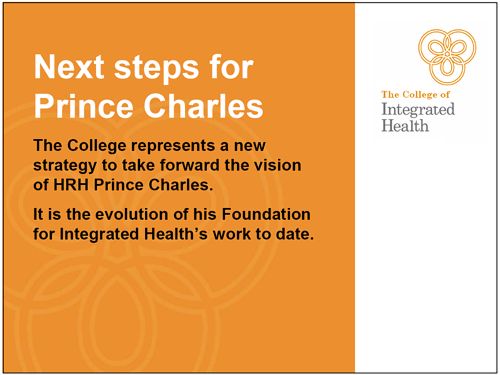
The author of the slide show is specified as "Linda". That, it is a fair bet, must be Linda Leung, who was Operations Director of the Prince’s Foundation until it closed, and is now Company Secretary for the "College of Medicine".
The final form of the "College" is still being argued about, but guess who will open it?
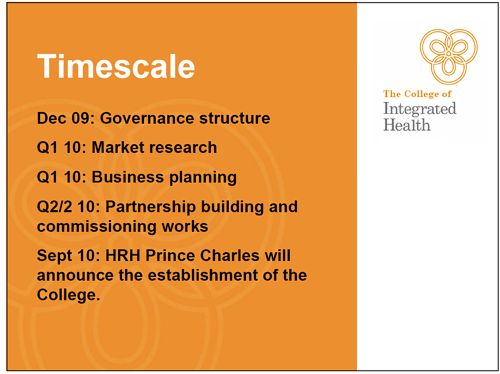
When ask about how Charles’ relationship with the College, The Office of TRH The Prince of Wales and The Duchess of Cornwall declined to make any comment, but simply referred me to Michael Dixon, who, in turn referred me to Pat Goodall.
Recently a statement from Clarence House to the Guardian said that "the Prince of Wales was aware of the college, but “has not been involved with setting-up the college, is not launching it and has no official role with it". That’s the official line anyway.
It is, of course, almost impossible to find out exactly what the relationship is between Prince Charles himself and the new "College". He operates largely out of sight, and the Freedom of Information Act, disgracefully, excludes his interference in the democratic process from public scrutiny.
Who is paying?
Flat 5 at 19 Buckingham Street was recently valued at half a million pounds. There is some serious money behind this venture. The rumour is that it’s from a ‘private donor’. Small prize for anyone who finds out who it is.
Aims of the College
The stated object of the College is "to advance health for the public benefit". Sounds good, but what does it mean? It doesn’t take long to find out. It is laid out in the document from Companies House.
To further its objects the Charity may:
7.1 engage with and develop communities of health professionals, health care providers and patients;
7.2 set standards and promote excellence in the fields of health and care;
7.3 lead, represent, train and support stakeholders so that they are better equipped to serve the public in improving the health ofthe public;
7.4 establish an evidence base for integrated health and for individual complementary modalities;
7.5 promote, foster and advance an integrated approach to health and care;
7.6 raise public, professional and political awareness and cultivate a sentiment in favour of an integrated approach to health and care by publishing and distributing books, pamphlets, reports, leaflets, journals, films, tapes and instructional matter on any media;
and so on, for 36 paragraphs. Already in paragraph 4 to 6 we see their interest is to promote “integrated health” and “complementary modalities. These of course are just what most of the rest of the world calls quackery. The objects don’t differ greatly from the Prince’s Foundation from which this outfit sprang.
What will be taught at the College?
Some information about the preliminary plans can be gleaned from a letter that describes the new College (download the letter). The letter says
“The College is developing two groups of courses. The first is aimed at registered professionals such as doctors, nurses and physiotherapists. It will familiarise them with different aspects of CAM and develop skills they can use in their day to day practice – not least techniques they can pass on to patients to help them manage their own conditions.”
In other words, the only course for doctors will be to teach them about quackery. Final judgement on that must await information about who will teach it.
“The second group of courses is aimed at non-registered practitioners and will focus on developing their understanding of conventional medicine, including ‘red flag’ symptoms, familiarisation with conventional therapeutics and increased awareness of critical appraisal.”
The other course, it seems, will be for quacks, to try to teach them enough real medicine to prevent them from killing too many people. The bit about teaching them about “critical appraisal” is hard to believe. If that were really done the clients would mostly be out of business.
If you were in any doubt at all about the aims of the College, it is necessary only to look at the four directors of the Company
Directors of the College of Medicine.
- Dr Michael Dixon, general practitioner. Michael Dixon was Medical Director of the Prince’s Foundation until it closed down.
- Professor George Lewith, is Professor of Health Research in the Complementary Medicine Research Unit, University of Southampton. He was a Foundation Fellow of the Prince’s Foundation until it closed down.
- Professor David Peters. is Professor of Integrated Healthcare and Clinical Director at the University of Westminster’s School of Integrated Health.
He was a Foundation Fellow of the Prince’s Foundation until it closed down. - Mrs Christine Glover is a pharmacist who sells homeopathic pills. She was a Foundation Fellow of the Prince’s Foundation until it closed down.
The company secretary is named as Linda Leung, who was Operations Director of the Prince’s Foundation until it closed.
A request to Michael Dixon for information was deflected to Mrs Pat Goodall She is yet another connection with PFIH. Mrs Goodall acted as a spokesperson for the Prince’s Foundation until it closed down. Now she is scheduled to become Director of Policy and Communications for the "College of Medicine". Mrs Goodall declined to say where the money came from. But she did say that the College was not the "equivalent of a further education college,. . . or higher education college", That being the case, it seems very odd to use the name "College of Medicine". It is a downright misleading name.
These people are all well know advocates of alternative medicine, It is very obvious that the "College of Medicine", despite its misleadingly innocuous name, is simply a reincarnation of the Prince’s Foundation for Integrated Health.
The term "integrated" is, of course, simply a euphemism for alternative medicine. That means those forms of medicine for which there is little or no evidence that they work. When evidence that something works is found, it is called simply medicine.
It may be useful to give a bit more information about the Directors.
Dr Michael Dixon OBE
Michael Dixon is devoted to just about every form of alternative medicine. As well as being medical director of the Prince’s Foundation he also runs the NHS Alliance. Despite its name, the NHS Alliance is nothing to do with the NHS and acts, among other things, as an advocate of alternative medicine on the NHS, about which it has published a lot.
Dr Dixon is also a GP at College Surgery, Cullompton, Devon, where his “integrated practice” includes dozens of alternative practitioners. They include not only disproven things like homeopathy and acupuncture, but also even more bizarre practitioners in ‘Thought Field Therapy‘ and ‘Frequencies of Brilliance‘.
To take only one of these, ‘Frequencies of Brilliance’ is bizarre beyond belief. One need only quote its founder and chief salesperson.
“Frequencies of Brilliance is a unique energy healing technique that involves the activation of energetic doorways on both the front and back of the body.”
“These doorways are opened through a series of light touches. This activation introduces high-level Frequencies into the emotional and physical bodies. It works within all the cells and with the entire nervous system which activates new areas of the brain.”
“Frequencies of Brilliance is a 4th /5th dimensional work. The process is that of activating doorways by lightly touching the body or working just above the body.”
“Each doorway holds the highest aspect of the human being and is complete in itself. This means that there is a perfect potential to be accessed and activated throughout the doorways in the body.”
Best of all, it can all be done at a distance (that must help sales a lot). One is reminded of the Skills for Health “competence” in distant healing (inserted on a government web site at the behest (you guessed it) of the Prince’s Foundation, as related here)
“The intent of a long distance Frequencies of Brilliance (FOB) session is to enable a practitioner to facilitate a session in one geographical location while the client is in another.
A practitioner of FOB that has successfully completed a Stage 5 Frequency workshop has the ability to create and hold a stable energetic space in order to work with a person that is not physically present in the same room.
The space that is consciously created in the Frequencies of Brilliance work is known as the “Gap”. It is a space of nonlinear time. It contains ”no time and no space” or respectively “all time and all space”. Within this “Gap” a clear transfer of the energies takes place and is transmitted to an individual at a time and location consciously intended. Since this dimensional space is in non-linear time the work can be performed and sent backward or forward in time as well as to any location.
The Frequencies of Brilliance work cuts through the limitations of our physical existence and allows us to experience ourselves in other dimensional spaces. Therefore people living in other geographic locations than a practitioner have an opportunity to receive and experience the work.
The awareness of this dimensional space is spoken about in many indigenous traditions, meditation practices, and in the world of quantum physics. It is referred to by other names such as the void, or vacuum space, etc.”
This is, of course, preposterous gobbledygook. It, and other things in Dr Dixon’s treatment guide, seem to be very curious things to impose on patients in the 21st century.
You can read more about Michael Dixon at Dr Aust’s blog (Dr Michael Dixon is annoyed), and, from the USA, Steven Novella’s analysis in Dr. Michael Dixon – “A Pyromaniac In a Field of (Integrative) Straw Men”
Professor George Lewith,
George Lewith has appeared quite often in this blog. He first came to my attention when I discovered in 2006 that his private clinic was offering a well-known form of fraudulent allergy diagnosis, the Vega test, despite the fact that Lewith himself had written a paper that said it didn’t work.
Lewith is particularly keen on acupuncture and that most discredited form of quackery, homeopathy. On More 4 News, he actually claimed that there was no good sham form of acupuncture. That is simply not true: great ingenuity has gone into devising controls for acupuncture trials and ‘real’ acupuncture always comes out the same as sham.
Professor David Peters
David Peters comes from the University of Westminster, which is famous for offering more degrees than any other in anti-scientific nonsense.
Westminster is home of the quite remarkable teaching that "Amethysts emit high Yin energy". dowsing, aura photography and other such fairground frauds.
Westminster offers also a "BSc degree" in that quite remarkable branch of make-believe known as naturopathy, This teaches students about a totally insane form of psycho-babble called Emo-trance and they are taught (no. seriously) about diagnosis with dowsing and pendulums
Westminster also teaches about kinesiology. Sounds sort of sciencey, but Applied Kinesiology is actually a fraudulent and totally ineffective diagnostic method invented by (you guessed) a chiropractor. It has been widely used by alternative medicine to misdiagnose food allergies. It does not work (Garrow, 1988: download reprint).
Westminster offers “BSc degrees” in Chinese Medicine that are a menace to public health. Their unfortunate students are told "Legally, you cannot claim to cure cancer. This is not a problem because we treat people not diseases". It is hard to imagine anything more irresponsible,
David Peters, as Clinical Director at Westminster must bear responsibility for this load of irresponsible make-believe, I have no doubt that he is well-intentioned but some of the stuff on these courses is a serious danger to public health.
Mrs Christine Glover
Mrs Glover is an Edinburgh pharmacist. She claims
She believes symptoms rarely occur in isolation but are usually linked to a persons circumstancs [sic].
Illness occurs when there are imbalances in any of the physical, emotional and spiritual aspects of their life.
Well, yes and no, Would you really go to her if you had cancer, or tuberculosis, or even atrial flutter? Judging by her website, what you’d get is a bottle of her Liquid Iron & Vitamin Formula (for £16.25 !). Or any one of a range of homeopathic pills.
There is no branch of alternative medicine that is more totally discredited than homeopathy. Yet now it i being proposed to form a College of Medicine with four directors who are all part of the dwindling band that insists you can do magic with pills that contain no medicine.
Who else supports the College?
There are some pretty surprising people who are listed in the letter as supporting the College of Medicine, though it remains to be seen how many are left once the true nature of the College is known.
Some of the supporters were already Foundation Fellows of the Prince’s Foundation, despite having no obvious sympathy with quackery. These include Professor Sir Cyril Chantler, Professor Adrian Eddleston and Professor Simon Gibbons. They also include the notorious Karol Sikora, and the geochemist Professor Jane Plant.
Professor Jane Plant is, apparently, a distinguished geochemist, but she developed an obsession with dairy-free diets, after her own experiences with breast cancer. She has written a lot of books and, no doubt, made a lot of money from the desperate. An extracr from one of her books is titled “Why I believe that giving up milk is the key to beating breast cancer”. If you want to see the ‘evidence’ for some of her wild claims, her web site invites to join -at a cost of £30. To get a bit closer to the truth it is only necessary to quote the World Cancer Research Fund (WCRF) Report on diet and cancer, ‘Food, Nutrition, Physical Activity, and the Prevention of Cancer: a Global Perspective‘. The WCRF is inclined, in my view, to exaggerate the strength of the evidence for a causal link between diet and cancer (see Diet and health. What can you believe: or does bacon kill you?) but nevertheless their assessment of dairy products is very different from Plant’s.
"The strongest evidence, corresponding to judgements of ‘convincing’ and ‘probable’, shows that milk probably protects against colorectal cancer, and that diets high in calcium are a probable cause of prostate cancer."
It seems that Jane Plant’s claims are thoroughly irresponsible.
I’m told that two people who were also Foundation Fellows, and who were originally listed as supporters of the College seem to have already jumped ship, namely Professor Stephen Holgate and Baroness Finlay.
Professor Sir Graeme Catto is to be president, and I’m told, Professor Sir Ian Kennedy has agreed to be vice president.
It is incomprehensible to me why people like this should be willing to lend their names to the Prince’s Foundation in the first place, or to its replacement now..
Other people listed as supporters include Sir Donald Irvine, Professor John Cox, and, on the "scientific advisory committee, Professor Mustafa Djamgoz and Professor Ajit Lalvani.
None of these people has an obvious belief in quackery. sp what are they doing mixed up with a venture like this?
Graeme Catto tells me he “knows very little about CAM”, and Cyril Chantler says the College should deal with evidence-based integrated medicine “but not alternative medicine or homeopathy”. Since, during his time as a Foundation Fellow of the Prince’s Foundation, Cyril Chantler failed totally to shake the advocacy of homeopathy by them, it seems unlikely yhat he’ll be any more successful with the College.
The only member of the "scientific advisory committee" who has answered by invitation to comment on a draft of this post is Professor Mustafa Djamgoz. It seems that he is more gullible that meets the eye He said, for example,
“There are many ‘eastern’ remedies (such as acupuncture that we witnessed dismissed 25 year ago) that work.”
“We ourselves have already shown that natural substances like omega-3 polyunsaturated fatty acids, reseveratrol [sic] etc can produce anti-cancer effects by blocking ion channels.”
Clearly Professor Djamgoz has not been keeping up with research in these areas. Has he never read Barker Bausell’s book on acupuncture, Snake Oil Science.? Apparently not. And there is, of course, not the slightest reason to think that omega-3 or resveratrol help cancer in humans.
It is often said that the reason that eminent people support quackery is that they live in hopes of a peerage. That is, perhaps, a bit uncharitable. I think it more likely that they don’t bother to investigate closely what it is they are signing up to, and that they are fooled by the weasel words of “integrated medicine”.
People like Catto and Chantler seem to think they are supporting caring, human centred, medicine. I fear they have been fooled, They are supporting sheer quackery.
Patient centred medicine
One of the most infuriating characteristics of quacks is their attempt to hi-jack the ‘human side of medicine’. I suppose they have little else to offer, so it’s understandable. But there is nothing human about deceiving desperate patients and the human side of medicine is something that is emphasised in the education of every real doctor.
If you want to know more about it, there is no better exposition than Michael Baum’s Samuel Gee lecture. Baum has been at the forefront of thinking about supportive or spiritual care of cancer patients. His 2009 Samuel Gee lecture is available in video, Concepts of Holism in Orthodox and Alternative Medicine. It is a masterpiece. He ends the lecture thus.
“Alternative versions of “holistic medicine” that offer claims of miracle cures for cancer by impossible dietary regimens, homeopathy or metaphysical manipulation of non-existent energy fields, are cruel and fraudulent acts that deserve to be criminalized.”
A similar distinction has been made with beautiful clarity by Dr James May
“The use of the term ‘integrative medicine’ in your editorial seems to confuse more than clarify the problem of ‘holism’ in medicine. Complementary therapists for example often use the term ‘holistic’ to blur the boundaries between the therapies used and the practitioner’s interpersonal skills. It would be better, however, to keep these distinctions clear. Caring is different from curing.”
“‘Holism’ is not a multifaceted approach to curing, it is a multifaceted approach to caring”
“Effective medicine is best measured with RCTs. Caring is not. ‘Integrative medicine’ therefore risks both damaging how we measure effective medicines (RCTs), as well as reducing caring to measurables. A better term for this might be ‘disintegrative medicine’.Effective medicine is best measured with RCTs. Caring is not. ‘Integrative medicine’ therefore risks both damaging how we measure effective medicines (RCTs), as well as reducing caring to measurables. A better term for this might be ‘disintegrative medicine’.”
I hope that the various eminent people who have lent their name to this mis-named ‘College of Medicine’ will look very carefully at what it actually does. And that will probably mean withdrawing their support.
Follow-up
The Guardian, 2nd August 2010, carried this story, written by their science correspondent, Ian Sample: College of Medicine born from ashes of Prince Charles’s holistic health charity. He quotes Tracey Brown of the Sense about Science charity as saying that the college’s emphasis on merging conventional medicine with unproven complementary therapies “would take society back a century”.
“Despite its mission to promote the integration of alternatives to medicine, this new body has chosen to call itself very grandly the College of Medicine. Perhaps someone thinks this will sound good with Royal in front of it? This wouldn’t be a surprise given the institution’s origins in the Prince of Wales’s efforts to integrate his favoured traditional remedies into medicine.”
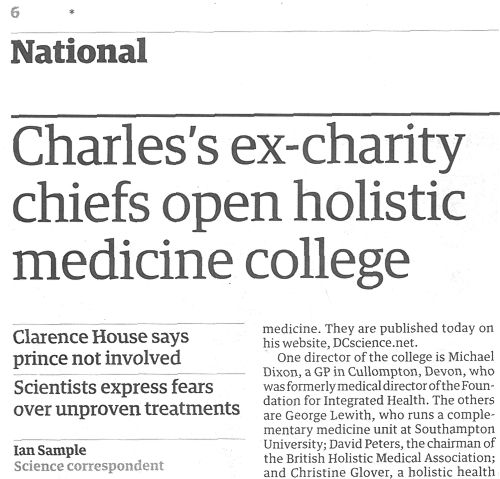
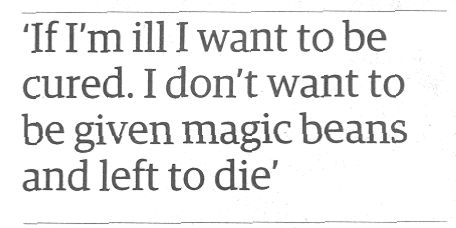
Quotation from DC
Western herbal medicine need not be mystical nonsense, but it usually it is,
Plants often contain chemicals that have pharmacological actions, with all the possibilities for good and for harm that implies (see Plants
as medicines). It would be quite possible to teach about the plant constituents and their actions in an entirely scientific way, but it seems that this is not what courses in herbal medicine choose to do. That is why they shouldn’t be called Bachelor of Science degrees.
We have recently revealed the ancient nonsense taught at Middlesex University in its "BSc (Hons)" degree in Traditional Chinese Medicine in Dangerous Chinese medicine taught at Middlesex University as well as similar dangerous gobbledygook from the University of Westminster: see Why degrees in Chinese medicine are a danger to patients.
Western Herbal medicine does not talk about "knotted spleen Qi", but has an equally barmy mystical vocabulary of its own. They have in common a tendency to divide herbs into hot and cold, a crude and baseless classification that dates from a time when nothing was known about physiology or the causes of disease.
A recent post described the problems of finding out what exactly is taught on these courses: Not much Freedom of Information at University of Wales, University of Kingston, Robert Gordon University or Napier University
I lodged a Freedom of Information (Scotland) Act with Napier University Edinburgh on 10th August 2009. As almost always, it was refused, as was the internal review of my request. The response to the internal review came from Gerry Webber BA (Hons) 0 PHil MBA MCMI AUA (Fellow). Despite all those impressive sounding letters, he argued with a perfectly straight face that it was perfectly all right for the university to teach this sort of stuff. He ended
“On public interest grounds, I have therefore concluded that, in respect of the commercially sensitive information requested, the public interest is better served in withholding the information you have requested than in disclosing it.”
Despite all those impressive sounding letters after Dr Webber’s name, here was a solemn letter, on the university letterhead, defending the teaching of pseudoscientific nonsense The experience is surreal, but far from unique.
Although we won a judgement that compelled disclosure from the Information Commissioner for England and Wales, the Scottish law is slightly different so I had to appeal to the Scottish Information commissioner. [Download appeal]
A similar appeal was lodged for Robert Gordon’s University Aberdeen. They have already sent some homeopathy materials, and closed down the homeopathy course, as described at: Robert Gordon University stops its homeopathy course. Quackademia is crumbling. Napier University followed the same pattern, but a bit more slowly. They sent some of what I asked for without waiting for a formal judgement, after they had been contacted by the Scottish Information Commissioner.
Napier also shut down the degree from which the slides, below, were used. It is fascinating that so many places have done this shortly before what is taught is made public. Before that time the courses are defended and advertised. no doubt by people who have never given a moment’s thought to what is taught. In 2007, after my Nature article on the topic, the Glasgow Herald said
A spokeswoman for Napier University said it stood by the integrity of its BSc degrees.
“The BSc Herbal Medicine course uses an approach to teaching and training that we believe best prepares students for practice within a modern integrated healthcare system,” she said.
The university’s brochure for the course (still, carelessly, on the web at the time of writing), waxed lyrical about the herbal medicine course. Yet as soon as it becomes known what’s actually taught, the courses close.
What was taught on Napier’s Herbal Medicine “BSc”.
Materia medica starts with hot and cold herbs
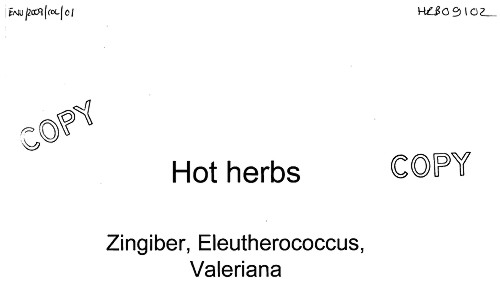
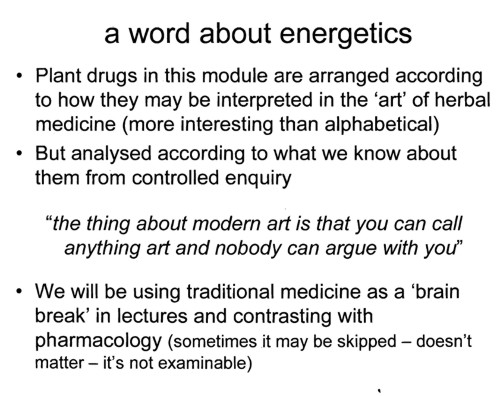
Yes, but one of the problems is that very little is known about the therapeutic actions of herbs from "controlled enquiry". The material just isn’t there to fulfil this aim. To paraphrase their quotation,,you can call anything medicine, but plenty of people will argue with you if you can’t produce the evidence.
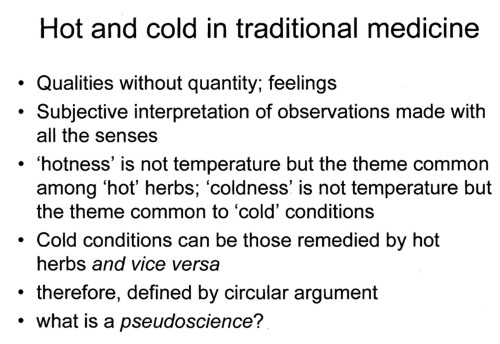
This slide strikes me as pure pre-scientific gobbledygook. All herbs and all diseases seem to fall into the ‘hot’ or ‘cold’ class. The ‘argument’ is entirely circular. Pure pseudoscience (is that what the lecturer told them in response to the last question?).
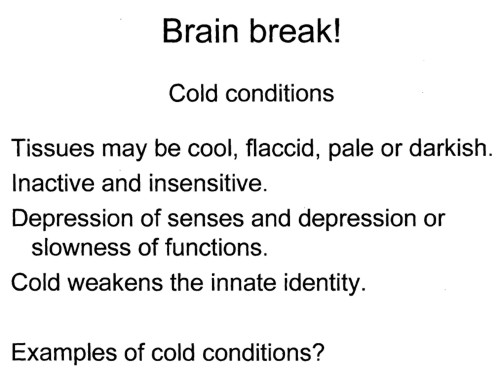
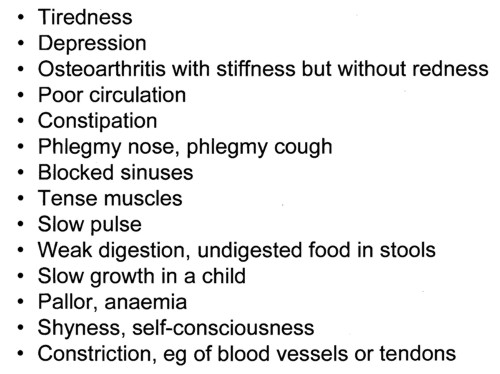
What do all these conditions have in common? They are all "cold". How can anyone take this sort of baloney seriously?
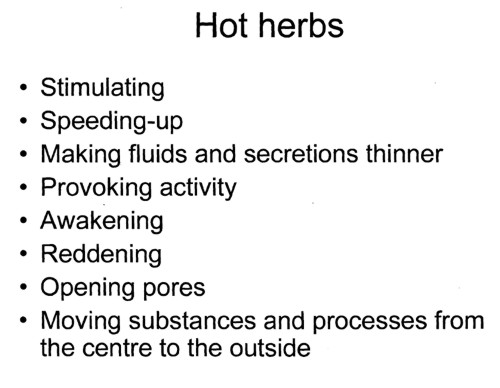
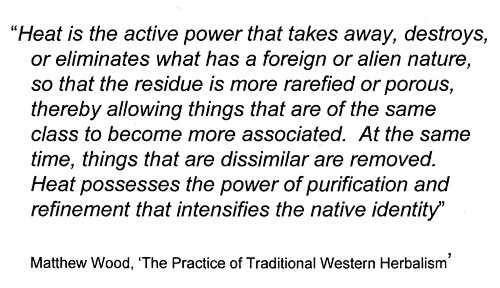
This quotation appears to have no comprehensible meaning at all. It carries overtones of the great "detox" fraud, and so perhaps is useful justification for slimming the wallets of the gullible.
Now we come to a real herb.
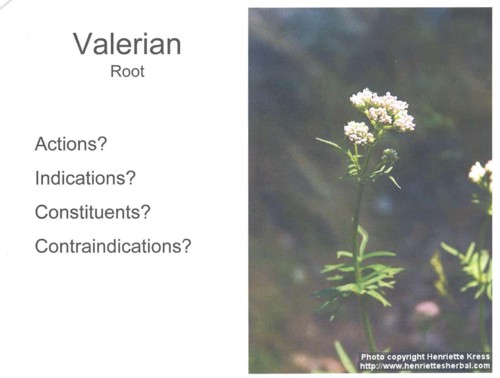
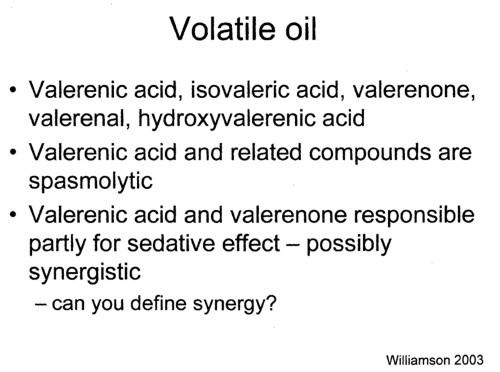
There is some real chenistry in this slide. Unfortunately it simply isn’t known whether these chemicals have any useful function. Usually it isn’t known either what dose of them you are giving in tincture of valerian. When I worked in a pharmacy in the 1950s, you could still find tincture of valerian on the shelves of a normal pharmacy, but iit soon vanished as paople realised it wasn’t much use. Disappeared from normal medicine, that is. it is still alive and well among herbalists.
Notice too, the mention of "synergy". The perpetual excuse of herbalists for giving impure mixtures of chemicals is that they might act synergistically. They are undeterred by the fact that no such synergy has ever been demonstrated properly. I asked that question ot Liz Williamson. editor of Potter’s herbal Cyclopedia, but answer came there none.
I’d be interested to know what answer was given to the last question, which isn’t as simple as it sounds. I wouldn’t mind betting it didn’t include a critical description of isobol analysis.
So what does Valerian do?
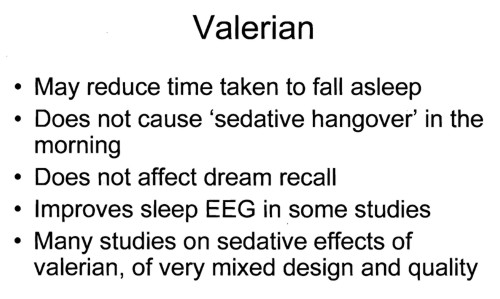
It seems, even from the lecture, that there is no unanimity that it does anything useful at all.
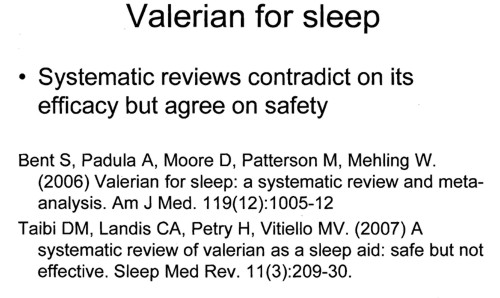
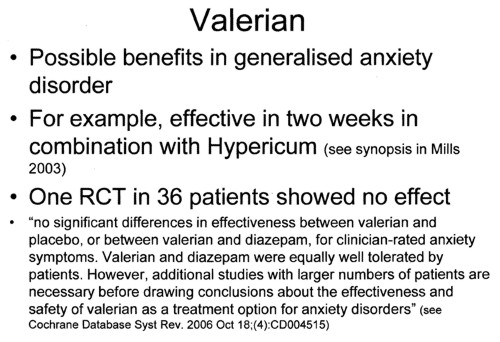
There is no worthwhile evidence to think it is useful for "generalises anxiety disorder" Let’s take another opinion.
The National Center for Complementary and Alternative Medicine (NCCAM) is the branch of the US National Institutes of Health which has spent around a billion dollars of US taxpayers’ money on research into alternative medicine, For all that effort they have failed to come up with a single useful treatment. Clearly they should be shut down. Nevertheless, as an organisation that is enthusiastic about alternative medicine, it’s interesting to see what they have to say about valerian.
What the Science Says
- Research suggests that valerian may be helpful for insomnia, but there is not enough evidence from well-designed studies to confirm this.
- There is not enough scientific evidence to determine whether valerian works for anxiety or for other conditions, such as depression and headaches.
Even NCCAM don’t pretend that there is any good reason to think it’s good for anything. So, you might ask, why are students being taught to treat people with it?
Simon Mills on "hot and cold herbs"
Many of the slides refer to a book by herbalist Simon Mills. You can see a video of a talk he gave in which he ‘explains’ "hot and cold herbs". It strikes me as pure gobbledygook. Make up your own mind.
Now take the test
This is a question from a Napier University exam paper


Which constituents are responsible for the actions of saw palmetto? Which actions would they be? This is what The National Center for Complementary and Alternative Medicine (NCCAM) says
about saw palmetto.
What the Science Says
- Several small studies suggest that saw palmetto may be effective for treating BPH symptoms.
- In 2006, a large study of 225 men with moderate-to-severe BPH found no improvement with 320 mg saw palmetto daily for 1 year versus placebo. NCCAM cofunded the study with the National Institute of Diabetes and Digestive and Kidney Diseases.
- There is not enough scientific evidence to support the use of saw palmetto for reducing the size of an enlarged prostate or for any other conditions.
- Saw palmetto does not appear to affect readings of prostate-specific antigen (PSA) levels. PSA is protein produced by cells in the prostate. The PSA test is used to screen for prostate cancer and to monitor patients who have had prostate cancer.
Magic Medicine
In the materials that I was sent, I see nothing to make me believe that herbalism is being taught as science. On the contrary, it all seems to confirm the definition given in the Patients’ Guide to Magic Medicine.

Herbal medicine BSc degrees still exist.
They are still running at the following universities.
The vice-chancellors are named because they are the people who must take responsibility for this sort of nonsense being taught in their universities.
University of East London (vice-chancellor from Feb 2010 is Patrick McGhee, who, in his previous job at University of Central Lancashire, did so much to prevent me from getting hold of their teaching materials, but then closed the courses anyway)
University of Lincoln (Vice chancellor, Professor Mary Stuart)
London Metropolitan University (vice-chancellor, (interim vice chancellor, Alfred Morris)
Middlesex University (vice-chancellor, Professor Michael Driscoll)
And, of course, the home of woo, the University of Westminster (vice-chancellor, Professor Geoffrey Petts). Their students are taught that Amethysts emit high Yin energy and that dowsing and pendulums can be used for diagnosis and treatment.
By the same token, we may congratulate Professor Dame Joan Stringer, vice-chancellor of Napier University Edinburgh for closing down the course from which these slides came. Perhaps now she should consider closing their ‘degrees’ in aromatherapy and ‘reflexology’
Follow-up
The term ‘evidence-based medicine’ seemed to me, when I first heard it, utterly ludicrous. It still does. What’s the alternative? Guess-work based medicine?
Quacks are fond of using cuddly words like ‘holistic’ and ‘integrative’, partly, one suspects, in an attempt to gain respectability and to disguise some of their barmier views. See, for example, Prince of Wales Foundation for magic medicine: spin on the meaning of ‘integrated’.
Advocates of evidence-based medicine are often accused by quacks of being hard-hearted calculators who want to take the soul out of medicine. Nothing could be further from the truth in my view. But I don’t practise medicine so it seemed to me to be worth quoting two of the best definitions I know, both from people at the sharp end of medicine.
James Matthew May
James May is a general practioner in London. He is also chairman of Healthwatch, an organisation that was exposing health fraud long before the recent explosion in the ‘skeptical blogosphere’.
The following passage was written as comment (‘rapid reponse’) to an editorial in the British Medical Journal. The editorial itself was (in my view) silly and misguided (Closing the evidence gap in integrative medicine, by Hugh MacPherson, David Peters, and Catherine Zollman). It is best forgotten as soon as possible. But James May’s comment deserves to be preserved and publicised. The highlights in bold font are mine.
|
The use of the term ‘integrative medicine’ in your editorial seems to confuse more than clarify the problem of ‘holism’ in medicine. Complementary therapists for example often use the term ‘holistic’ to blur the boundaries between the therapies used and the practitioner’s interpersonal skills. It would be better, however, to keep these distinctions clear. Caring is different from curing. The point of RCTs is to establish how much of a treatment’s efficacy is independent of the ideas, concerns, and expectations of either the patient or the clinician. Using ‘multi-modal’ or ‘synergistic’ research methods is likely to confuse this important distinction. ‘Holism’ is not a multifaceted approach to curing, it is a mulitfaceted approach to caring. A truly holistic clinician will ‘cure sometimes, relieve often and comfort always’. Comforting may not produce a positive clinical outcome – but we should still do it. Historically speaking caring pre-existed effective medicine by millenia, but it was a principle motive for finding effective medicine. Caring therefore is not a subset of medicine, instead medicine is one of the tools used for caring. ‘Integrative medicine’ as a concept, however, blurs this boundary. It has been wisely observed that ‘if we keep trying to measure what we value, we will end up only valuing what we can measure.’ This particular ‘evidence gap’ is therefore probably best left; filled instead by caring doctors. Effective medicine is best measured with RCTs. Caring is not. ‘Integrative medicine’ therefore risks both damaging how we measure effective medicines (RCTs), as well as reducing caring to measurables. A better term for this might be ‘disintegrative medicine’. Competing interests: Chairman of HealthWatch |
Michael Baum
Baum is a recently-retired cancer surgeon from UCLH. As well as being s surgeon with a strong interest in scientific medicine, he has been at the forefront of thinking about supportive or spiritual care of cancer patients. His 2009 Samuel Gee lecture is available in video, Concepts of Holism in Orthodox and Alternative Medicine. It is a masterpiece. The conclusion puts his view bluntly (again the emphasis is mine).
|
Conclusion Holism in medicine is an open ended and exquisitely complex understanding of human biology that over time has lead to spectacular improvements in the length and quality of life of patients with cancer. This approach encourages us to consider the transcendental as much as the cell and molecular biology of the human organism. Alternative versions of “holistic medicine” that offer claims of miracle cures for cancer by impossible dietary regimens, homeopathy or metaphysical manipulation of non-existent energy fields, are cruel and fraudulent acts that deserve to be criminalized. Such “alternative” versions of holism are arid and closed belief systems, locked in a time warp, incapable of making progress yet quick to deny progress in the field of scientific medicine. |
Follow-up
One member of parliament, above all others, has championed reason for the last 13 years, But Evan Harris was not re-elected in Oxford West and Abingdon. On May 6th he got 23,730 votes, a mere 176 votes fewer than his conservative rival.

Click picture to see hero movie (be patient) (or right click to download mpg file)
Let me declare an interest. Evan Harris is one of the most principled men I have ever had the pleasure to meet. His stands on human rights, civil rights and libel law reform have been exemplary. He is also one of the few (and now fewer) members of parliament who understands how science works and its importance for the future of the UK. He has been a tireless advocate for the idea that policy should be based on evidence (as opposed to guesswork)..
Harris is also an atheist, something that one would not expect to be very relevant in a country where the influence of religion has declined progressively for many years. It would not be relevant if it were not for the fact that his defeat was brought about by poisonous lies propagated by, ahem, evangelical christians. I’m an atheist too, but I have met some good christians, I think they are wrong about their sky fairies, but I also think they should be free to believe in them if they want. Some of them do good things as a result of their beliefs. But not in Oxford West and Abingdon.
The (just) winner was conservative Nicola Blackwood. She is a member of the Conservative Christian Fellowship. But curiously a search of her web site for ‘christian’ shows not a single result. Shouldn’t voters know about your beliefs? It seems distinctly dishonest not to admit that your views come from an old book as interpreted by old men, The voter should know your motives.
Her profile at the Conservative Christian Fellowship says
“Along with many Christians, she is concerned that right to freedom of religion is being undermined without proper understanding of the potential consequences for faith groups or the wider community. In particular, she fears that the voice of Christians and people of other faiths on key issues of conscience is too readily dismissed in public debate.”
But what did Nicola Blackwood know about the smear leaflets?
Nicola Blackwood’s web site not only doesn’t mention the word ‘christian. It says very little about policies of any sort, There is no
mention of euthanasia or any of the other questions raised in pamphlets that were distributed throughout the constituency. There is a well hidden disclaimer
"Nicola has distanced the Conservative Party from literature distributed by private individuals and special interest and pressure groups attacking her opponent".
That is a pretty weak response to the poisonous and inaccurate leaflets that were circulated (they can be seen here). The worst stuff came form two sources
The Reverend Lynda Rose.
Lynda Rose is an Anglican minister who seems to think it appropriate to call a good man "Dr Death" because of her religious ‘principles’. Here is part of her leaflet

Lynda Rose has extreme "pro-life" views, more like those of the pope than of the average anglican. She seems not unlike the extreme right wing fundamentalist religious groups found in the USA. Harris told the Oxford Mail that
“It is a pity that, instead of putting up a candidate to contest the election, an anonymous group, using money from no-one knows where, is distributing an inaccurate personal attack leaflet in this constituency for the first time ever.
“It is offensive and I would say profoundly unchristian to use the term Dr Death – associated with Nazi murderer Joseph Mengele or mass-murderer Harold Shipman – to describe any politician.”
The Reverend Rose replied to the this in a letter to the Oxford Mail (April 26th) that is reproduced on the web site Anglican
Mainstream ("Anglo-catholic, Evangelical, Orthodox, Charismatic, Mainstream"). There is not a word of apology for vilely defamatory use of “Dr Death”, but merely a huffy defence of Hansard’s voting records.
That takes some beating as uncharitable, intolerant, inaccurate (and defamatory) comment. But there is even worse to come.
Keith Mann was another candidate in the same election. In 1994 Mann was sentenced to 14 years in jail, reduced to 11 years on appeal, for 21 offences including possession of explosives, incitement, criminal damage, and escape from custody (from Wikipedia). His leaflets were even worse than those of the Reverend Lynda Rose.
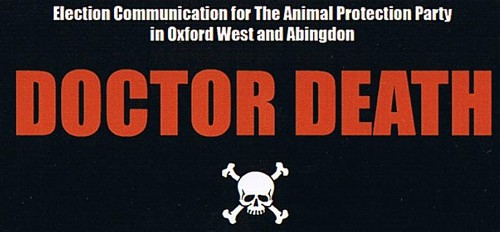
This vile calumny, full of inaccurate allegations and written by someone wth a serious criminal record, was aimed at a deeply-principled man. No doubt helped Nicola Blackwood to scrape in, but I can find no direct denunciation of it from Ms Blackwood. Christians don’t seem to be fussy about their allies.
Then there were the newspapers, in particular the Daily Telegraph.
Cristina Odone was editor of the Catholic Herald from 1991 to 1996. She is another ‘good christian’ who wrote an abominably nasty piece in the Daily Telegraph on April 19th. The Lib Dems are a Jekyll and Hyde party. Forget nice Mr Clegg. What about ‘Dr Death’? It is worth looking at it as a prime example of inaccurate, ad hominem, nastiness. It is also worth looking at for the comments: there were a lot of comments (thanks to an alert via Twitter) and most of them were along the lines of this of one of the first, from the redoubtable skepchick
"Thanks for the heads up, Cristina! Now I know to cheer for the LibDems. I want to know that if I end up in a vegetative state, I’m given a peaceful death rather than my own Telegraph column."
Most importantly, read the calm, diginified and polite response from Evan Harris himself.
I have never said that that the current abortion rate is not of import (you just made that up Christina!) and indeed have argued for more effective sex and relationships education as other countries manage and which also delays first sexual intercourse. And for better access to effective contraception. We can disagree on that too but best to have a rational discussion rather than a distortion.
I have never said “God is bad, his followers mad”. You made that up again Christina! I respect the religious view actually but believe that the state should be neutral on religion and it should not be privileged by the state above other beliefs.
My own comment took a while because of the Telegraph’s clunky registration system.
“This truly vile piece of writing shows all the tolerance of an Ayatollah who advocates rule by religious dogma (well actually, of course, by his own opinions). There could hardly be a worse moment to seek to impose catholic values on the rest of society. That church, including its head, has been seem to fail to report to the police the most vile crimes. It is in deep disgrace precisely because of its lack of moral principles.
One thing was very clear: she doesn’t understand the web. Her follow-up article seemed to think that the response was organised by Lib Den HQ! The Lib Dems’ spooky posse of internet pests. Sorry, Ms Odone, but these days concerned individuals can speak up.
The Reverand Goerge Pitcher, anglican minister at St Bride’s church, Fleet Street, was the next priest to bring disgrace on christianity with another incredibly nasty piece, again in the Telegraph, The best result of the election: Let’s rejoice that Lib Dem Evan Harris has lost his seat.
Again there were many hostile comments, including quite a lot from christians.
“Speaking as a Christian, I find it amazing how many Christians are capable of being thoroughly nasty about people they dislike. I have made a mental note that if I ever find myself seeking a church in central London, I shall avoid St Brides, Fleet St like the plague.”
and from ex-christians
“Dr Evan Harris is more of a doctor than either you or Nadine Dorris are “human beings”. You are both spiteful, evil people, and you are exactly the sort of person that drove me to reject the Catholic Church, and ask for an official notice of my defection to be placed in the baptismal register of my parish.”
Father Raymond Blake is another cleric who thinks you should vote according to his interpretation of the bible. His web site is as political as that of the christian taleban of the southern USA,
and just about as charitable. He too uses the "Dr Death" abuse, with no consideration of what Harris actually advocates.
How is it that christians (and homeopaths) can be quite so unpleasant?
Religious people, and those with other belief systems that resemble religions are supposed, traditionally, to be warm, caring people, charitable, forgiving and selfless, That, at least is the image they like to cultivate. Of course it has never been quite as simple as that. Just think of the inquisition, the warring catholics and protestants and, right now, the sordid disgrace of child rape, and its cover up by the highest officials of the vatican.
Last easter, I added a bit to the 2008 diary section of this blog about why I’m not a christian It seems to be worth repeating here.
"When I was about 15 I went to a Summer camp which turned out to be run by christian evangelists (my parents swore they didn’t realise that it was a brain-washing camp). I was converted and became rather earnest. Then, at 18, I met a nurse. Being on Merseyside, she was Irish. And being 18, I was rather interested in sex. The price of sex was to go with her to mass, so of course I went. It was Easter and they were doing the Twelve Stations of the Cross. I still recall watching this, with mounting horror. The priests were just enjoying it too much. It was almost like a sado-masochistic orgy. The priests seemed to be almost masturbating. It was simply sick."
I was reminded of this streak of cruelty that runs through christianity by the comment made by an aide to Tony Blair who said
“I couldn’t help feeling TB was rather relishing his first blooding as PM, sending the boys into action. Despite all the necessary stuff about taking action ‘with a heavy heart’, I think he feels it is part of his coming of age as a leader.”
His enthusiasm for a war that has killed over 100,000 people (and cost a small fortune) seems sadly consistent with his catholicism,
Despite all this, some individual religious people have done good for humankind.
Likewise proponents of magic medicine are proud of their individual caring approach and this may indeed be helpful in eliciting a good placebo response.
The problem seems to be that neither group can tolerate criticism. They aren’t interesting in discussing anything, because they just know they are right. And if anyone tries to express an opinion that differs from their own, the niceness vanishes like the snow in spring.
The quotations above show the downright nasty vindictiveness of religious people towards an honourable man who happens to hold somewhat different views to their own.
Likewise the cuddly homeopaths show astonishing abusive nastiness to anyone who doesn’t believe in their magic. I allow them to say what they want on this blog but they routinely delete comments. Along with most of my scientific friends, I’ve been subject to abuse and utterly incorrect allegations. I don’t enjoy it, but if its the price of free speech, so be it.
I fear that these things represent the incursion into UK politics of the extreme polarisation seen in the USA. a place where religious people seem to think it is moral to shoot doctors who do abortions.
Some morality. Thank you Tony Blair.
Some other blogs on this topic
Dr Aust wrote Catholicism plus writing in the Telegraph apparently makes you barking mad.
Tessera wrote Playing dirty politics. Attacks on Dr Evan Harris
A liberal Dose (Neil Fawcett) wrote Extremists to the left of me, fundies to the right.
Richard Dawkins wrote Evan Harris: Is this why he lost his seat?
Ophelia Benson wrote three good posts (via comment from Swiss Frank)
http://www.butterfliesandwheels.org/2010/gloating-for-britain/
http://www.butterfliesandwheels.org/2010/byrnes-on-harris-pitcher-on-pitcher/
http://www.butterfliesandwheels.org/2010/peculiar-george/and, via Butterflies and Wheels,
Clifford Longley has trenchant comment on Platitude of the Day
Follow-up
Texas schools board rewrites US history with lessons promoting God and guns. Chris McGreal, in the Guardian writes about the sort of thing that the clerics mentioned here might love.
“US Christian conservatives drop references to slave trade and sideline Thomas Jefferson who backed church-state separation”
“Several changes include sidelining Thomas Jefferson, who favoured separation of church and state, while introducing a new focus on the “significant contributions” of pro-slavery Confederate leaders during the civil war.”
“The new curriculum asserts that “the right to keep and bear arms” is an important element of a democratic society. Study of Sir Isaac Newton is dropped in favour of examining scientific advances through military technology.
There is also a suggestion that the anti-communist witch-hunt by Senator Joseph McCarthy in the 1950s may have been justified.
The education board has dropped references to the slave trade in favour of calling it the more innocuous “Atlantic triangular trade”, and recasts the Israeli-Palestinian conflict as driven by Islamic fundamentalism.”
Sometimes I wonder why one bothers with print. You don’t have active links, you don’t get discussion in comments, and editors alter what you want to say.
This post is about events that followed the removal by the University of Buckingham of its accreditation of the Diploma in Integrated Medicine, as described here.. This diploma was run by the "Faculty of Integrated Medicine" (FIM) which consists largely of Dr Rosy Daniel and Dr Mark Atkinson. The FIM is, in turn, the product of a charity, the Integrated Health Trust (IHT). Oddly enough, the IHT’s web site still says "The two-year, part-time Membership Programme in Integrated Medicine has been accredited as a post-graduate diploma by the University of Buckingham" (as of 13 May 2010). The FIM web site makes similar claims. "Used to be" accredited would be more appropriate.
The advisory board of IHT consists almost entirely of supporters of various forms of alternative medicine, some of whom have been mentioned already on this blog. The respectable supporters who appeared when FIM’s diploma was first announced have vanished, and now they rely entirely on a couple of celebrity endorsements, and a few anecdotes about miracle cures. This is behaviour that is characteristic of all quacks.
After the post here, the story was printed on 13th April in Times Higher Education, under the headline It’s terminal for integrated medicine diploma. On 25th April a reply from Dr Daniel on the THE web site, ‘Terminal’? We’ve only just begun. This attracted a lot of comments. I rather liked the first one,
“The question is: who will stand up and support the formalisation of IM education for doctors and nurses in the UK?”. Not anyone with more than one working neuron, that’s who.
My own comment was rather more restrained than some of the semi-literate abuse from alternative medicine enthusiasts.
On 29th April, Daniel got another go in on the Times Higher Education web site, with the title ‘Bad’ Scientist. This time she got rather personal. Realising that not everyone reads the web version, I thought a print response was called for. I sent them a full response. At their request it was
cut down to the length of a letter, and even then they cut out the reference to Andrew Weil. The abbreviated letter was published on 13th May as Don’t shoot the messenger.
For the record, here is the complete response that I sent.
|
In response to your report [It’s terminal for integrated medicine diploma] and my blog Dr Daniel, in her two recent contributions to THE [‘Terminal’? We’ve only just begun, and ‘Bad’ Scientist], Dr Daniel describes me as misguided, intimidatory, undemocratic, antisocial and prejudiced. Ouch. I can understand that she may well be a bit upset, having recently been rejected by both the University of Buckingham and even by that bastion of all things barmy, the Prince’s Foundation for Integrated Health (now deceased). I’d like to remind her that it was not I who closed the Buckingham course. That decision was made by Terence Kealey (Buckingham’s VC) and Prof Andrew Miles. And it was the Office of Trading Standards, not I, who made her change the claims on her company’s web page about the alleged “healing” powers of a herbal concoction, Carctol, for cancer. All that I did was help to find out about some of the things that were being taught on her course. I find it quite surprising how often vice-chancellors have no idea what’s going on, but Kealey, unlike most, was interested to find out. Dr Daniel is right about one thing. I’m not a clinician. On the other hand, I do perhaps know a little bit about evidence. She claims that diet can save you from breast cancer but in the comments section it has already been pointed out that the 2007 study invoked by Dr Daniel does not come to the conclusion that she said it does. Furthermore she ignores entirely the 2010 EPIC study, published in the Journal of the National Cancer Institute (102:529-537). This study, of almost 500,000 people in ten European countries, found barely any relationship between intake of fruit and vegetables and cancer risk. This may be disappointing, but it can only harm patients to ignore the evidence when, as in this case, it exists. There are plenty of reasons to eat well, but apparently avoiding cancer is not one of them. It seems to be a bit more complicated than that. Dr Daniel says "IM in the UK is still clouded by complementary and alternative medicine (CAM) detractors owing to an important misunderstanding: IM is not CAM.". I beg to differ. The content of the course is about alternative as you can get. It included teachers who have advocated the Q-link pendant to "protect" you from evil radio waves. It is not long since Ben Goldacre opened one of these pendants and found it contained "No microchip. A coil connected to nothing. And a zero-ohm resistor, which costs half a penny, and is connected to nothing". You can’t get more alternative than that. We are told that a new programme is to be launched in May by "advisory board member, Andrew Weil. If you want to learn more about Weil, I suggest the article by ex-editor of the New England Journal of Medicine, Arnold Relman [A Trip to Stonesville: Some Notes on Andrew Weil (1998)]. That is the Dr Weil who has claimed he has insights into medical truth while under the influence of drugs. It is also the Dr Weil who, last year, was threatened with criminal prosecution in a warning letter sent jointly from the Food and Drugs Administration and the Federal Trade Commission because of “Unapproved/Uncleared/Unauthorized Products Related to the H1N1 Flu Virus” In fact every good doctor takes into account the " interaction of emotional, social and physical needs". There is no need to call this "integrative". it is just good medicine. I suggest looking at Michael Baum’s superb Samuel Gee lecture, "Concepts of holism in orthodox and alternative medicine". We are told that "The IHT is now looking for a strong collaborating university partner that will not be intimidated by the likes of Colquhoun". I’m sorry that Dr Daniel sees my approach as "intimidation" and “scare tactics”. The fact of the matter is that the content of the course is truly scary. Once what is taught on courses on alternative medicine is made public, the courses usually seem to close. The contents are just too embarrassing for even the most mercenary vice-chancellor to tolerate. Dr Daniel tells us she is “now looking for a strong collaborating university partner”. If any universities are tempted, I’d suggest that they should first write to the vice-chancellor of Buckingham, Terence Kealey, to seek his advice. |
Follow-up
Still no takers for FIM: June 2010. I made some enquiries about rumours that the Faculty of Integrated Medicine (FIM), having been fired by Buckingham, and rejected by the Prince’s Foundation (deceased), would seek validation from another institution. The University of Bristol says it has not been contacted by FIM. The University of Middlesex, which still runs several courses in magic medicine, was a more likely taker. However, after a long correspondence they responded as follows on June 15, 2010.
“Following an approach by Dr Rosy Daniel to the University, an informal meeting took place between Dr Daniel and our Associate Dean, Academic Development. As a result of that meeting and conversations with other colleagues in the University it was decided that proposals for the University to become a validating partner for the Faculty of Integrated Medicine would not be taken forward. The decision was relayed to Dr Daniel orally.”
3 March 2011. Unsurprisingly, Dr Daniel is up and running again, under the name of the British College of Integrated Medicine. The only change seems to be that Mark Atkinson has jumped ship altogether, and, of course, she is now unable to claim endorsement by Buckingham, or any other university. Sadly, though, Karol Sikora seems to have learned nothing from the saga at the University of Buckingham. He is still there as chair of the Medical Advisory Board, along with the usual suspects mentioned above.
|
Hot off the press The Prince’s Foundation for Integrated Health (FIH) has been spreading misinformation about medicine since 1993. It has featured often on this blog. Now it has closed its doors. |
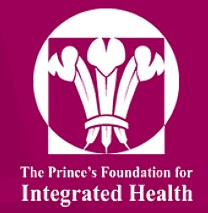
|
An announcement has appeared on the FIH website
|
30 April 2010 The Trustees of The Prince’s Foundation for Integrated Health have decided to close the charity. |
The announcement goes on
"Whilst the closure has been planned for many months and is part of an agreed strategy, the Trustees have brought forward the closure timetable as a result of a fraud investigation at the charity."
"The Trustees feel that The Foundation has achieved its key objective of promoting the use of integrated health. Since The Foundation was set up in 1993, integrated health has become part of the mainstream healthcare agenda, with over half a million patients using complementary therapies each year, alongside conventional medicine. . . "
While the immediate precipitating cause may have been the fraud (see below), the idea that the Foundation "has achieved its key objective of promoting the use of integrated health" seems like a ludicrous bit of make-believe. Well, make-believe is something with which the Foundation was quite familiar. At a time when university courses in quackery are vanishing like the snow in springtime, they can hardly believe that their aims have been achieved. But I guess one could not expect them to say "sorry folks, we were wrong all along".
The 2010 Conference is cancelled too
Judging by the quality of the 2009 conference, which I analysed at length last year, the cancellation of the 2010 conference is very welcome news (except perhaps to a few sycophants looking for honours).
What next? A College?
The rumour is that a “College of Integrated Medicine” may arise from the ashes of FIH. Or even, heaven forbid. a Royal College of Integrated baloney. Since universities seem to be deciding that it isn’t sensible to teach myth as truth, i is not unlikely.
“Prince Charles’s aide at homeopathy charity arrested on suspicion of fraud“
This headline, of an article in the Guardian, by Robert Booth, was not entirely unexpected.
The parlous state of the accounts at the Prince’s Foundation for Integrated Health has been documented already at
Gimpy’s blog.
“An aide in Prince Charles’s campaign for wider use of complementary medicine in the NHS was arrested at dawn today on suspicion of fraud and money-laundering at the prince’s health charity.
A 49-year old man, understood to be a former senior official at the Prince’s Foundation for Integrated Health, was taken into custody at a police station in north London. He was arrested alongside a 54-year-old woman, who was being held at the same address.
The arrests follow a police investigation into £300,000 unaccounted for in the books of the charity, of which the Prince is president.”
More news will appear here, as it comes in.
Follow-up
Other posts on this topic appeared rapidly.
The Guardian 30 April. Robert Booth Prince of Wales’s health charity wound up in wake of fraud investigation
Dr Aust’s Spleen 30 April In memoriam. In which Dr Aust gets a bit poetic
Quackometer 30 April. Prince’s Foundation for Integrated Health Closes. Prince Charles’ Toad Eaters are no more.
Followed by the rest of the mainstream media.
Edzard Ernst 1 May 2010, in the Indepenndent. Better than any journalist. Why alternative medicine wins from the foundation’s demise. Read it! Here are some quotations.
“I therefore think that the FIH has become a lobby group for unproven and disproven treatments populated by sycophants.”
“The FIH has repeatedly been economical with the truth. For instance when it published a DoH-sponsored patient guide that was devoid of evidence. They claimed evidence was never meant to be included. But I had seen a draft where it was and friends have seen the contract with the DoH where “evidence” was an important element. “
“I hope that, after the demise of FIH, the discussion about alternative medicine in the UK can once more become rational. I also hope that Prince Charles has the greatness of selecting advisers who actually advise rather than “Yes Men” who are hoping to see their names on the next Honours List. “
1 May 2010. According to Martin Delgado, in the Daily Mail, the people who were arrested on suspicion of fraud were accountant George Gray and his wife. Gray was Finance Director and acting Chief Executive of FIH. About as senior as you can get.
Gray spent two weeks (two weeks?) at Diabetes UK in 2004 before becoming finance director at the Leadership Foundation For Higher Education.
Every single request for information about course materials in quack medicine that I have ever sent has been turned down by universities,
It is hardly as important as as refusal of FoI requests to see climate change documents, but it does indicate that some vice-chancellors are not very interested in openness. This secretiveness is exactly the sort of thing that leads to lack of trust in universities and in science as a whole.
The one case that I have won took over three years and an Information Tribunal decision against the University of Central Lancashire (UCLAN) before I got anything.
UCLAN spent £80,307.95.(inc VAT at 17.5%) in legal expenses alone (plus heaven knows how much in staff time) to prevent us from seeing what was taught on their now defunct “BSc (Hons) homeopathy”. This does not seem to me to be good use of taxpayers’ money. A small sample of what was taught has already been posted (more to come). It is very obvious why the university wanted to keep it secret, and equally obvious that it is in the public interest that it should be seen.
UCLAN had dropped not only its homeopathy "degree" before the information was revealed, They also set up an internal inquiry into all the rest of their courses in magic medicine which ended with the dumping of all of them.
Well, not quite all, There was one left. An “MSc” in homeopathy by e-learning. Why this was allowed to continue after the findings of UCLAN’s internal review, heaven only knows. It is run by the same Kate Chatfield who ran the now defunct BSc. Having started to defend the reputation against the harm done to it by offering this sort of rubbish, I thought I should finish. So I asked for the contents of this course too. It is, after all, much the same title as the course that UCLAN had just been ordered to release. But no, this request too was met with a refusal
Worse still, the refusal was claimed under section 43(2) if the Freedom of Information Act 2000. That is the public interest defence, The very defence that was dismissed in scathing terms by the Information Tribunal less than two months ago,
To add insult to injury, UCLAN said that it would make available the contents of the 86 modules in the course under its publication scheme, at a cost of £20 per module, That comes to £1,720 for the course, Some freedom of information.
Because this was a new request, it now has to go through the process of an internal reviw of the decision before it can ne referred to the Information Commissioner. That will be requested, and since internal reviews have, so far, never changed the initial judgment. the appeal to the Information Commissioner should be submitted within the month. I have been promised that the Information Commissioner will deal with it much faster this time than the two years it took last time.
And a bit more unfreedom
Middlesex University
I first asked Middlesex for materials from their homeopathy course on 1 Oct 2008. These courses are validated by Middlesex university (MU) but actually run by the Centre for Homeopathic Education. Thw MU site barely mentions homeopathy and all I got was the usual excuse that the uninsersity did not possess the teaching materials. As usual, the validation had been done without without looking at what was actually being taught. The did send me the validation document though [download it] As usual, the validation document shows no sign at all of the fact that the usbject of the "BSc" is utter nonsense. One wonderful passage says
“. . . the Panel were assured that the Team are clearly producing practitioners but wanted to explore what makes these students graduates? The Team stated that the training reflects the professional standards that govern the programme and the graduateness is achieved through developing knowledge by being able to access sources and critically analyse these sources . . . “
Given that the most prominent characteristic of homeopaths (and other advocates of magic medicine) is total lack of critical ability, this is hilarious. If they had critical ability they wouldn’t be homeopaths. Hilarious is not quite the right word, It is tragic that nonsense like this can be found in an official university document.
Middlesex, though it doesn’t advertise homeopathy, does advertise degrees in Traditional Chinese Medicine, Herbal Medicine and Ayurveda. On 2nd February 2010 I asked for teaching materials from these courses. Guess what? The request was refused. In this case the exemptions under FOIA were not even invoked but I was told that "All these materials are presently available only in one format at the University – via a student-only accessed virtual learning environment. ". Seems that they can’t print out the bits that I asked for, The internal review has been requested, then we shall see what the Information Commissioner has to say.
Two other cases are at present being considered by the Information Commissioner (Scotland), after requests under the Scottish FoIA were refused. They are interesting cases because they bear on the decision, currently being considered by the government, about whether they should implement the recommendations of the execrable Pittilo report.
Napier University Edinburgh. The first was for teaching material form the herbal medicine course at Napier University Edinburgh. I notice that this course no longer appears in UCAS or on Napier’s own web site, so maybe the idea that its contents might be disclosed has been sufficient to make the university do the sensible thing.
Robert Gordon University Aberdeen The second request was for teaching material from the “Introduction to Homeopathy” course at the Robert Gordon University Aberdeen. The particular interest that attaches to this is that the vice-chancellor of Robert Gordon university is Michael Pittilo. The fact that he is willing to tolerate such a course in his own university seems to me to disqualify him from expressing any view on medical subjects.
Michael Pittilo, Crohn’s disease and Andrew Wakefield
Michael Pittilo has not been active in science for some time now, but Medline does show scientiifc publications for Pittilo RM, between 1979 anf 1998. Between 1989 and 1995 there are five papers published jointly with one Andrew Wakefield. These papers alleged a relationship between measles virus and Crohn’s disease. The papers were published before tha infamous 1998 paper by Wakefield in the Lancet (now retracted) that brought disgrace on Wakefield and probably caused unnecessary deaths.. The link between measles and Crohn’s disease is now equally disproved.
The subject has been reviewed by Korzenik (2005) in Past and Current Theories of Etiology of IBD. Toothpaste, Worms, and Refrigerators
“Wakefield et al proposed that Crohn’s results from a chronic infection of submucosal endothelium of the intestines with the measles virus [Crohn’s disease: pathogenesis and persistent measles virus infection. Wakefield AJ, Ekbom A, Dhillon AP, Pittilo RM, Pounder RE., Gastroenterology, 1995, 108(3):911-6]”
"This led to considerable media interest and< public concern over use of live measles vaccine as well as other vaccines. A number of researchers countered these claims, with other studies finding that titers to measles were not increased in Crohn’s patients, granulomas were not associated with endothelium 49 , measles were not in granulomas50 and the measles vaccine is not associated with an increased risk of Crohn’s disease51–55 "
This bit of history is not strictly relevant to the Pittilo report, but I do find quite puzzling how the government chooses people from whom it wishes to get advice about medical problems.
Follow-up
I notice that the Robert Gordon university bulletin has announced that
“Professor Mike Pittilo, Principal of the University, has been made an MBE in the New Year Honours list for services to healthcare”.
That is a reward for writing a very bad report that has not yet been implemented, and one hopes, for the sake of patients, will never be implemented. I do sometimes wonder about the bizarre honours system in the UK.
Postcript.
On 16th February, the death of Michael Pittilo was announced. He had been suffeing from cancer and was only 55 years old. I wouldn’t wish that fate on my worst enemy.
The purpose of this post is to reveal a few samples of things that are taught on a homeopathy ‘degree’ course. The course in question was the "BSc Hons homeopathy course at the University of Central Lancashire (UCLAN). Entry to this course was closed in 2008 and, after an internal review, UCLAN closed almost all of the rest of its courses in alternative medicine too. The university is to be commended for this .
The purpose of making public some of what used to be taught is not to embarrass UCLAN, which has already done the sensible thing, but to make it clear that the sort of thing taught on such courses is both absurd and dangerous, in the hope of discouraging other courses
|
.Three years after I first asked for teaching materials, the Information Commisioner ruled that all the reasons given for refusal were invalid, and they must be handed over. However UCLAN then appealed against the decision, so the appeal went to an Information Tribunal. That appeal was lost decisively and UCLAN was.obliged to provide the whole of the course material. On Christmas Eve I got five large box files, 13.7 kg of documents, or 30 pounds, in old money. |

|
Because these documents are copyright, I rely on the twin defences of fair quotation (only a tiny proportion is being quoted) and public interest. The Information Tribunal decided very firmly that it was in the public interest that it should be known what is taught on such courses, and that can be achieved if some of it is made public. Here are a few extracts.
Code of ethics
The students are given a copy of the code of ethics of the Society of Homeopaths. This is 25 pages long, but paragraph 48 is especially interesting.
48 Advertisements, stationery and name plates maintain a high standard of propriety and
integrity to enhance the reputation of homeopathy.
- Advertising shall not contain claims of superiority.
- No advertising may be used which expressly or implicitly claims to cure named diseases.
- Advertising shall not be false, fraudulent, misleading, deceptive, extravagant or sensational.
No mention though, of the fact that this code of ethics has been repeatedly breached by the Society of Homeopaths itself, on its own website. See, for example, here in 2007 and again in 2009. as well as Ernst’s article on this topic.
Anyone who has followed dialogues among homeopaths knows that "claims to cure named diseases" is the norm not the exception. The code of ethics is just a bad joke. And the (late) course at UCLAN was no exception. Take, for example, course HP3002, Therapeutic Homeopathy, module leader Jean Duckworth.
Homeopathic treatment of cancer
There was a lecture on HP3002 called "A Homeopathic Approach to Cancer (Ramakrishnan methodology [sic])".. Here are 10 slides from that lecture. It is illegal to claim to be able to cure cancer under the Cancer Act 1939. If a homeopath were to make claims like these in public they’d be open to prosecution, not to mention in breach of the SoH’s code of ethics. If cancer is not a "named disease", what is?
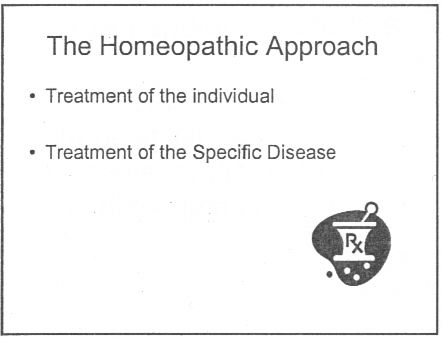
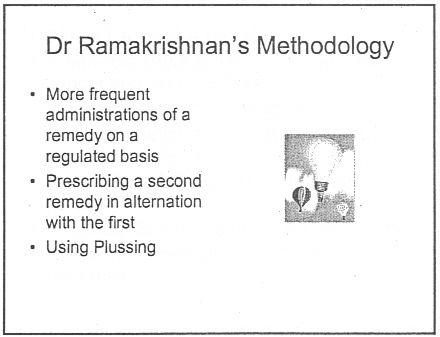
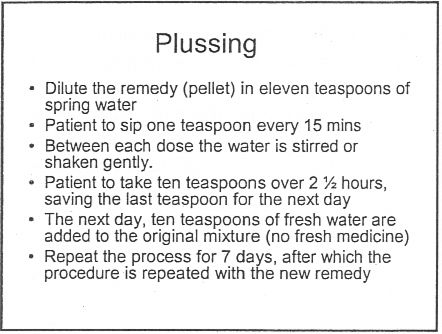
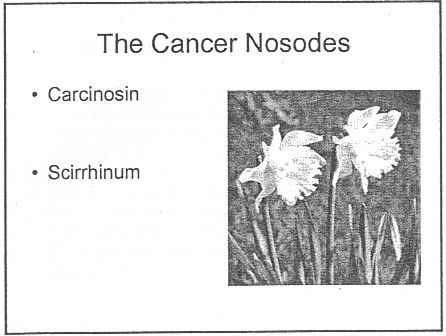
Specific treatments for a named disease are recommended.
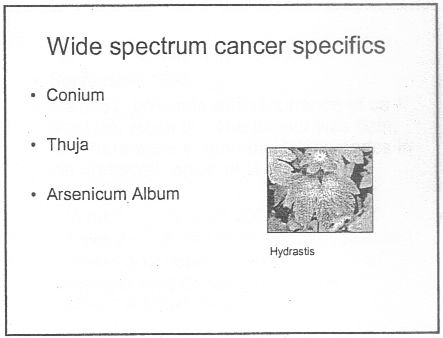
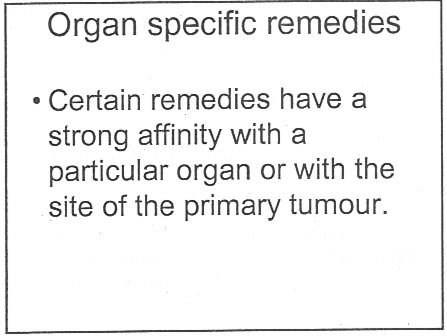
What happened to treating the whole person? Now specific organs are being treated. The term "affinity", as used here, is of course sheer hocus pocus.
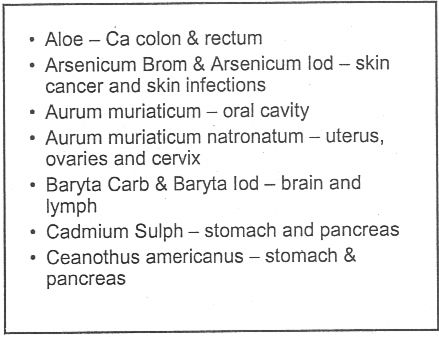
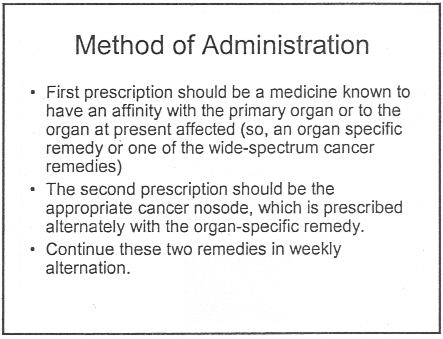
It is easy to forget when reading this that none of the “medicines” contain any medicine whatsoeever.
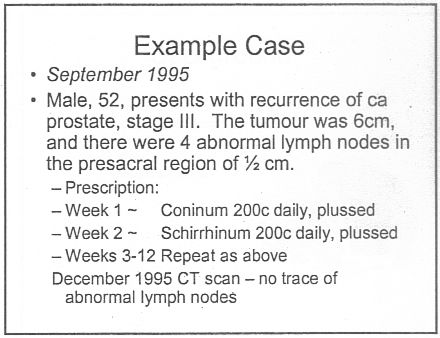
Notice that the term "remedy" is used throughout. Any reasonable person would interpret "remedy" to imply "cure", though no doubt a homeopath, if challenged, would claim that "remedy" carried no such implication. The last slide is typical of junk medicine: the personal testimonial, supplied with no detail whatsoever. Just an anecdote which is useless as evidence.
This lecture alone strikes me as a cruel (and possibly illegal) hoax perpetrated on desperate patients. Of course a true believer might get some solace from taking the sugar pills, but that is not sufficient justification.
The same course dealt with quite a lot of other "named diseases", autism, ADHD and coping with a heart attack. And, you are asked, did you think arnica is just a first aid remedy?
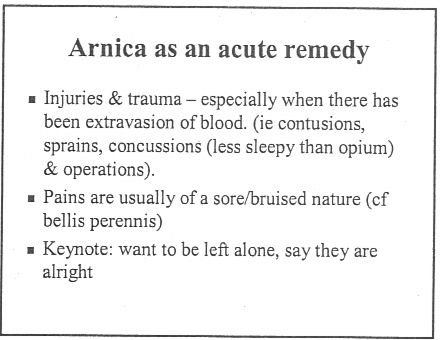
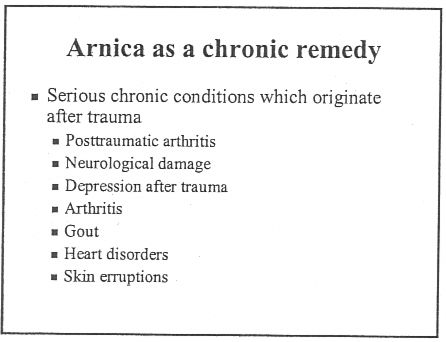
If that isn’t a list of "named diseases", what is? The code of ethics appears to be a total sham.
And of course never forget that the “arnica” doesn’t contain any arnica anyway. And if you don’t believe that you can read the words of Kate Chatfield, module leader on thie very course, as recorded in the minutes of evidence to the Select Committee on Science and Technology .
Q538 Lord Broers: I have a simple, technical question about homeopathy and drugs. Is it possible to distinguish between homeopathic drugs after they have been diluted? Is there any means of distinguishing one from the other?
Ms Chatfield: Only by the label.
You can read a lovely analysis of the views of Kate Chatfield by physicist A.P. Gaylard here.
Follow-up
The Daily Telegraph. January 8th 2009 Ian Douglas reported on this post: The workings of a BSc in homeopathy
The Lancashire Evening Post carried a big spread on January 15th, Professor seeks out the truth about ‘quackery’.
River’s Edge. News and thoughts from Preston, Lancashire reviewed the Lancashire Evening Post article on Saturday January 16th: Homeopathy at UCLAN, a degree in quackery.
The cost of trying to stop this material being revealed. UCLAN told me on 5 February 2010 that the legal costs alone were £80,307.94 (inc. VAT). That doesn’t include staff time and photocopying. I’m not convinced that this was a good way to spend taxpayers’ money.
The Yuletide edition of the BMJ carries a lovely article by Jeffrey Aronson, Patent medicines and secret remedies. (BMJ 2009;339:b5415).
I was delighted to be asked to write an editorial about it, In fact it proved quite hard work, because the BMJ thought it improper to be too rude about the royal family, or about the possibility of Knight Starvation among senior medics. The compromise version that appeared in the BMJ is on line (full text link).
The changes were sufficient that it seems worth posting the original version (with links embedded for convenience).
The cuts are a bit ironic, since the whole point of the article is to point out the stifling political correctness that has gripped the BMA, the royal colleges, and the Department of Health when it comes to dealing with evidence-free medicine. It has become commonplace for people to worry about the future of the print media, The fact of the matter is you can often find a quicker. smarter amd blunter response to the news on blogs than you can find in the dead tree media. I doubt that the BMJ is in any danger of course. It has a good reputation for its attitude to improper drug company influence (a perpetual problem for clinical journals) as well as for clinical and science articles. It’s great to see its editor, Fiona Godlee, supporting the national campaign for reform of the libel laws (please sign it yourself).
The fact remains that when it comes to the particular problem of magic medicine, the action has not come from the BMA, the royal colleges, and certainly not from the Department of Health, It has come from what Goldacre called the “intrepid, ragged band of bloggers”. They are the ones who’ve done the investigative journalism, sent complaints and called baloney wherever they saw it. This article was meant to celebrate their collective efforts and to celebrate the fact that those efforts are beginning to percolate upwards to influence the powers that be.
It seems invidious to pick on one example, but if you want an example of beautiful and trenchant writing on one of the topics dealt with here, you’d be better off reading Andrew Lewis’s piece "Meddling Princes, Medical Regulation and Licenses to Kill” than anything in a print journal.
I was a bit disappointed by removal of the comment about the Prince of Wales. In fact I’m not particularly republican compared with many of my friends. The royal family is clearly good for the tourist industry and that’s important. Since Mrs Thatcher (and her successors) destroyed large swathes of manufacturing and put trust in the vapourware produced by dishonest and/or incompetent bankers, it isn’t obvious how the UK can stay afloat. If tourists will pay to see people driving in golden coaches, that’s fine. We need the money. What is absolutely NOT acceptable is for royals to interfere in the democratic political process. That is what the Prince of Wales does incessantly. No doubt he is well-meaning, but that is not sufficient. If I wanted to know the winner of the 2.30 at Newmarket, it might make sense to ask a royal. In medicine it makes no sense at all. But the quality of the advice is irrelevant anyway. The royal web site itself says “As a constitutional monarch, the Sovereign must remain politically neutral.”. Why does she not apply that rule to her son? Time to put him over your knee Ma’am?
Two of the major bits that were cut out are shown in bold, The many other changes are small.
BMJ editorial December 2009
Secret remedies: 100 years onTime to look again at the efficacy of remedies Jeffrey Aronson in his article [1] gives a fascinating insight into how the BMA, BMJ and politicians tried, a century ago, to put an end to the marketing of secret remedies. They didn’t have much success. The problems had not improved 40 years later when A.J. Clark published his book on patent medicines [2]. It is astounding to see how little has changed since then. He wrote, for example, “On the other hand the quack medicine vendor can pursue his advertising campaigns in the happy assurance that, whatever lies he tells, he need fear nothing from the interference of British law. The law does much to protect the quack medicine vendor because the laws of slander and libel are so severe.”> Clark himself was sued for libel after he’d written in a pamphlet “ ‘Cures’ for consumption, cancer and diabetes may fairly be classed as murderous”. Although he initially tried to fight the case, impending destitution eventually forced him to apologise [3]. If that happened today, the accusation would have been repeated on hundreds of web sites round the world within 24 hours, and the quack would, with luck, lose [4]. As early as 1927, Clark had written “Today some travesty of physical science appears to be the most popular form of incantation” [5]. That is even more true today. Homeopaths regularly talk utter nonsense about quantum theory [6] and ‘nutritional therapists’ claim to cure AIDS with vitamin pills or even with downloaded music files. Some of their writing is plain delusional, but much of it is a parody of scientific writing. The style, which Goldacre [7] calls ‘sciencey’, often looks quite plausible until you start to check the references. A 100 years on from the BMA’s efforts, we need once again to look at the efficacy of remedies. Indeed the effort is already well under way, but this time it takes a rather different form. The initiative has come largely from an “intrepid, ragged band of bloggers” and some good journalists, helped by many scientific societies, but substantially hindered by the BMA, the Royal Colleges, the Department of Health and a few vice-chancellors. Even NICE and the MHRA have not helped much. The response of the royal colleges to the resurgence in magic medicine that started in the 1970s seems to have been a sort of embarrassment. They pushed the questions under the carpet by setting up committees (often populated with known sympathizers) so as to avoid having to say ‘baloney’. The Department of Health, equally embarrassed, tends to refer the questions to that well-known medical authority, the Prince of Wales (it is his Foundation for Integrated Health that was charged with drafting National Occupational Standards in make-believe subjects like naturopathy [8]. Two recent examples suffice to illustrate the problems. The first example is the argument about the desirability of statutory regulation of acupuncture, herbal and traditional Chinese medicine (the Pittilo recommendations) [9]. Let’s start with a definition, taken from ‘A patients’ guide to magic medicine’ [10]. “Herbal medicine: giving patients an unknown dose of an ill-defined drug, of unknown effectiveness and unknown safety”. It seems to me to be self-evident that you cannot start to think about a sensible form of regulation unless you first decide whether what you are trying to regulate is nonsense, though this idea does not seem to have penetrated the thinking of the Department of Health or the authors of the Pittilo report. The consultation on statutory regulation has had many submissions [11] that point out the danger to patients of appearing to give official endorsement of treatments that don’t work. The good news is that there seems to have been a major change of heart at the Royal College of Physicians. Their submission points out with admirable clarity that the statutory regulation of things that don’t work is a danger to patients (though they still have a blank spot about the evidence for acupuncture, partly as a result of the recent uncharacteristically bad assessment of the evidence by NICE [12]). Things are looking up. Nevertheless, after the public consultation on the report ended on November 16th, the Prince of Wales abused his position to make a well-publicised intervention on behalf of herbalists [13]. Sometimes I think his mother should give him a firm lesson in the meaning of the term ‘constitutional monarchy’, before he destroys it. The other example concerns the recent ‘evidence check: homeopathy’ conducted by the House of Commons Science and Technology Select Committee (SCITECH). First the definition [10]: “Homeopathy: giving patients medicines that contain no medicine whatsoever”. When homeopathy was dreamt up, at the end of the 18th century, regular physicians were lethal blood-letters, and it’s quite likely that giving nothing saved people from them. By the mid-19th century, discoveries about the real causes of disease had started, but homeopaths remain to this day stuck in their 18th century time warp. In 1842 Oliver Wendell Holmes said all that needed to be said about medicine-free medicine [14]. It is nothing short of surreal that the UK parliament is still discussing it in 2009. Nevertheless it is worth watching the SCITECH proceedings [15]. The first two sessions are fun, if only for the statement by the Professional Standards Director of Boots that they sell homeopathic pills while being quite aware that they don’t work. I thought that was rather admirable honesty. Peter Fisher, clinical director of the Royal Homeopathic Hospital, went through his familiar cherry-picking of evidence, but at least repeated his condemnation of the sale of sugar pills for the prevention of malaria. But for pure comedy gold, there is nothing to beat the final session. The health minister, Michael O’Brien, was eventually cajoled into admitting that there was no good evidence that homeopathy worked but defended the idea that the taxpayer should pay for it anyway. It was much harder to understand the position of the chief scientific advisor in the Department of Health, David Harper. He was evasive and ill-informed. Eventually the chairman, Phil Willis, said “No, that is not what I am asking you. You are the Department’s Chief Scientist. Can you give me one specific reference which supports the use of homeopathy in terms of Government policy on health?”. But answer came there none (well, there were words, but they made no sense). Then at the end of the session Harper said “homeopathic practitioners would argue that the way randomised clinical trials are set up they do not lend themselves necessarily to the evaluation and demonstration of efficacy of homeopathic remedies, so to go down the track of having more randomised clinical trials, for the time being at least, does not seem to be a sensible way forward.” Earlier, Kent Woods (CEO of the MHRA) had said “the underlying theory does not really give rise to many testable hypotheses”. These two eminent people seemed to have been fooled by the limp excuses offered by homeopaths. The hypotheses are testable and homeopathy, because it involves pills, is particularly well suited to being tested by proper RCTs (they have been, and when done properly, they fail). If you want to know how to do it, all you have to do is read Goldacre in the Guardian [16]. It really isn’t vert complicated. “Imagine going to an NHS hospital for treatment and being sent away with nothing but a bottle of water and some vague promises.” “And no, it’s not a fruitcake fantasy. This is homeopathy and the NHS currently spends around £10million on it.” That was written by health journalist Jane Symons, in The Sun [17]. A Murdoch tabloid has produced a better account of homeopathy than anything that could be managed by the chief scientific advisor to the Department of Health. And it isn’t often that one can say that. These examples serve to show that the medical establishment is slowly being dragged, from the bottom up, into realising that matters of truth and falsehood are more important than their knighthoods. It is all very heartening, both for medicine and for democracy itself. David Colquhoun. Declaration of interests. I was A.J. Clark chair of pharmacology at UCL, 1985 – 2004. 1. Aronson, JK BMJ 2009;339:b5415 2. Clark, A,J, (1938) Patent Medicines FACT series 14, London. See also Patent medicines in 1938 and now https://www.dcscience.net/?p=257 3. David Clark “Alfred Joseph Clark, A Memoir” (C. & J. Clark Ltd 1985 ISBN 0-9510401-0-3) 4. Lewis, A. (2007) The Gentle Art of Homeopathic Killing 5. A.J. Clark (1927) The historical aspect of quackery, BMJ October 1st 1927 6. Chrastina, D (2007) Quantum theory isn’t that weak, (response to Lionel Milgrom). 7 Goldacre, B. (2008) Bad Science. HarperCollins 8. Skills for Health web site 9. A very bad report: gamma minus for the vice-chancellor 10. A Patients’ Guide to Magic Medicine, and also in the Financial Times. 12. NICE fiasco, part 2. Rawlins should withdraw guidance and start again 13. BBC news 1 December 2009 Prince Charles: ‘Herbal medicine must be regulated’. 14. Oliver Wendell Holmes (1842) Homeopathy and Its Kindred Delusions. 15. House of Commons Science and technology committee. Evidence check: homeopathy. Videos and transcripts available at http://www.viewista.com/s/fywlp2/ez/1 16. Goldacre, B. A Kind of Magic Guardian 16 November 2007. 17. Homeopathy is resources drain says |
Follow-up
There is a good account of the third SCITECH session by clinical science consultant, Majikthyse, at The Three Amigos.
16 December 2009.. Recorded an interview for BBC Radio 5 Live. It was supposed to go out early on 17th.
17 December 2009. The editorial is mentioned in Editor’s Choice, by deputy editor Tony Delamothe. I love his way of putting the problem "too many at the top of British medicine seem frozen in the headlights of the complementary medicine bandwagon". He sounds remarkably kind given that I was awarded (by the editor, Fiona Godlee, no less) a sort of booby prize at the BMJ party for having generated a record number of emails during the editing of a single editorial (was it really 24?). Hey ho.
17 December 2009. More information on very direct political meddling by the Prince of Wales in today’s Guardian, and in Press Association report.
17 December 2009. Daily Telegraph reports on the editorial, under the heading “ ‘Nonsense’ alternative medicines should not be regulated“. Not a bad account for a non-health journalist.
17 December 2009. Good coverage in the excellent US blog, Neurologica, by the superb Steven Novella.’ “Intrepid, Ragged Band of Bloggers” take on CAM‘ provides a chance to compare and contrast the problems in the UK and the USA.’
18 December 2009. Article in The Times by former special advisor, Paul Richards. “The influence of Prince Charles the lobbyist is out of hand. Our deference stops us asking questions.”
“A good starting point might be publication of all correspondence over the past 30 years. Then we will know the extent, and influence, of Prince Charles the lobbyist.”
Comments in the BMJ Quite a lot of comments had appeared by January 8th, though sadly they were mostly from the usual suspects who appear every time one suggests evidence matters. A reply was called for, so I sent this (the version below has links).
After a long delay, this response eventually appeared in the BMJ on January 15 2010.
It’s good to see so many responses, though somewhat alarming to see that several of them seem to expect an editorial to provide a complete review of the literature. I ‘ll be happy to provide references for any assertion that I made.
I also find it a bit odd that some people think that an editorial is not the place to express an opinion robustly. That view seems to me to be a manifestation of the very sort of political correctness that I was deploring. It’s a bit like the case when the then health minister, Lord Hunt, referred to psychic surgery as a “profession” when he should have called it a fraudulent conjuring trick. Anything I write is very mild compared with what Thomas Wakley wrote in the Lancet, a journal which he founded around the time UCL came into existence. For example (I quote)
“[We deplore the] “state of society which allows various sets of mercenary, goose-brained monopolists and charlatans to usurp the highest privileges…. This is the canker-worm which eats into the heart of the medical body.” Wakley, T. The Lancet 1838-9, 1
I don’t think it is worth replying to people who cite Jacques Benveniste or Andrew Wakefield as authorities. Neither is it worth replying to people who raise the straw man argument about wicked pharmaceutical companies (about which I am on record as being as angry as anyone). But I would like to reply directly to some of the more coherent comments.
Sam Lewis and Robert Watson. [comment] Thank you for putting so succinctly what I was trying to say.
Peter Fisher [comment]. I have a lot of sympathy for Peter Fisher. He has attempted to do some good trials of homeopathy (they mostly had negative outcomes). He said he was "very angry" when the non-medical homeopaths were caught out recommending their sugar pills for malaria prevention (not that this as stopped such dangerous claims which are still commonplace). He agreed with me that there was not sufficient scientific basis for BSc degrees in homeopathy. I suppose that it isn’t really surprising that he continues to cherry pick the evidence. As clinical director of the Royal London Homeopathic Hospital and Homeopathic physician to the Queen, just imagine the cognitive dissonance that would result if he were to admit publicly that is all placebo after all. He has come close though. His (negative) trial for homeopathic treatment of rheumatoid arthritis included the words "It seems more important to define if homeopathists can genuinely control patients’ symptoms and less relevant to have concerns about whether this is due to a ‘genuine’ effect or to influencing the placebo response” [2]. [download
the paper]. When it comes to malaria, it matters a lot.
Adrian White [comment] seems to be cross because I cited my own blog. I did that simply because if he follows the links there he will find the evidence. In the case of acupuncture it has been shown time after time that "real" acupuncture does not differ perceptibly from sham. That is true whether the sham consists of retractable needles or real needles in the "wrong" places. A non-blind comparison between acupuncture and no acupuncture usually shows some advantage for the former but it is, on average, too small to be of much clinical significance [3]. I agree that there is no way to be sure that this advantage is purely placebo effect but since it is small and transient it really doesn’t matter much. Nobody has put it more clearly than Barker Bausell in his book, Snake Oil Science [4]
White also seems to have great faith in peer review. I agree that in real science it is probably the best system we have. But in alternative medicine journals the "peers" are usually other true believers in whatever hocus pocus is being promoted and peer reveiw breaks down altogether.
R. M. Pittilo [comment] I’m glad that Professor Pittilo has replied in person because I did single out his report for particular criticism. I agree that his report said that NHS funding should be available to CAM only where there is evidence of efficacy. That was not my criticism. My point was that in his report, the evidence for efficacy was assessed by representatives of Herbal Medicine, Chinese Medicine and Acupuncture (four from each). Every one of them would have been out of work if they had found their subjects were nonsense and that, no doubt, explains why the assessment was so bad. To be fair, they did admit that the evidence was not all that it might be and recommended (as always) more research I’d like to ask Professor Pittilo how much money should be spent on more research in the light of the fact that over a billion dollars has been spent in the USA on CAM research without producing a single useful treatment. Pittilo says "My own view is that both statutory regulation and the quest for evidence should proceed together" but he seems to neglect the possibility that the quest for evidence might fail. Experience in the USA suggests that is exactly what has, to a large extent, already happened.
I also find it quite absurd that the Pittilo report should recommend, despite a half-hearted admission that the evidence is poor, that entry to these subjects should be via BSc Honours degrees. In any case he is already thwarted in that ambition because universities are closing down degrees in these subjects having realised that the time to run a degree is after, not before, you have some evidence that the subject is not nonsense. I hope that in due course Professor Pittilo may take the same action about the courses in things like homeopathy that are run by the university of which he is vice-chancellor. That could only enhance the academic reputation of Robert Gordon’s University.
George Lewith [comment] You must be aware that the proposed regulatory body, the Health Professions Council, has already broken its own rules about "evidence-based practice" by agreeing to take on, if asked, practitioners of Herbal Medicine, Chinese Medicine and Acupuncture. They have (shamefully) excluded the idea that claims of efficacy would be regulated. In other word they propose to provide exactly the sort of pseudo-regulation which would endanger patients They are accustomed to the idea that regulation is to do only with censoring practitioners who are caught in bed with patients. However meritorious that may be, it is not the main problem with pseudo-medicine, an area in which they have no experience. I’m equally surprised that Lewith should recommend that Chinese evaluation of Traditional Chinese medicine should be included in meta-analyses, in view of the well-known fact that 99% of evaluations from China are positive: “No trial published in China or Russia/USSR found a test treatment to be ineffective” [5]. He must surely realise that medicine in China is a branch of politics. In fact the whole resurgence in Chinese medicine and acupuncture in post-war times has less to do with ancient traditions than with Chinese nationalism, in particular the wish of Mao Tse-Tung to provide the appearance of health care for the masses (though it is reported that he himself preferred Western Medicine).
1. Lord Hunt thinks “psychic surgery” is a “profession”. https://www.dcscience.net/?p=258
2. Fisher, P. Scott, DL. 2001 Rheumatology 40, 1052 – 1055. [pdf file]
3. Madsen et al, BMJ 2009;338:a3115 [pdf file]
4. R, Barker Bausell, Snake Oil Science, Oxford University Press, 2007
5. Vickers, Niraj, Goyal, Harland and Rees (1998, Controlled Clinical Trials, 19, 159-166) “Do Certain Countries Produce Only Positive Results? A Systematic Review of Controlled Trials”. [pdf file]
15 January 2010. During the SciTech hearings, Kent Woods (CEO of the MHRA) made a very feeble attempt to defend the MHRA’s decision to allow misleading labelling of homeopathic products. Now they have published their justification for this claim. It is truly pathetic, as explained by Martin at LayScience: New Evidence Reveals the MHRA’s Farcical Approach to Homeopathy. This mis-labelling cause a great outcry in 2006, as documented in The MHRA breaks its founding principle: it is an intellectual disgrace, and Learned Societies speak out against CAM, and the MHRA.
22 January 2010 Very glad to see that the minister himself has chosen to respond in the BMJ to the editorial
|
Rt Hon. Mike O’Brien QC MP, Minister of State for Health Services I am glad that David Colquhoun was entertained by my appearance before the Health Select Committee on Homeopathy. But he is mistaken when he says, “you cannot start to think about a sensible form of regulation unless you first decide whether or not the thing you are trying to regulate is nonsense.” Regulation is about patient safety. Acupuncture, herbal and traditional Chinese medicine involve piercing the skin and/or the ingestion of potentially harmful substances and present a possible risk to patients. The Pittilo Report recommends statutory regulation and we have recently held a public consultation on whether this is a sensible way forward. Further research into the efficacy of therapies such as Homeopathy is unlikely to settle the debate, such is the controversy surrounding the subject. That is why the Department of Health’s policy towards complementary and alternative medicines is neutral. Whether I personally think Homeopathy is nonsense or not is besides the point. As a Minister, I do not decide the correct treatment for patients. Doctors do that. I do not propose on this occasion to interfere in the doctor-patient relationship. |
Here is my response to the minister
|
I am very glad that the minister himself has replied. I think he is wrong in two ways, one relatively trivial but one very important. First, he is wrong to refer to homeopathy as controversial. It is not. It is quite the daftest for the common forms of magic medicine and essentially no informed person believes a word of it. Of course, as minister, he is free to ignore scientific advice, just as the Home Secretary did recently. But he should admit that that is what he is doing, and not hide behind the (imagined) controversy. Second, and far more importantly, he is wrong, dangerously wrong, to say it I was mistaken to claim that “you cannot start to think about a sensible form of regulation unless you first decide whether or not the thing you are trying to regulate is nonsense". According to that view it would make sense to grant statutory regulation to voodoo and astrology. The Pittilo proposals would involve giving honours degrees in nonsense if one took the minister’s view that it doesn’t matter whether the subjects are nonsense or not. Surely he isn’t advocating that? The minister is also wrong to suppose that regulation, in the form proposed by Pittilo, would do anything to help patient safety. Indeed there is a good case to be made that it would endanger patients (not to mention endangering tigers and bears). The reason for that is that the main danger to patients arises from patients being given “remedies” that don’t work. The proposed regulatory body, the Health Professions Council, has already declared that it is not interested in whether the treatments work or not. That in itself endangers patients. In the case of Traditional Chinese Medicine, there is also a danger to patients from contaminated medicines. The HPC is not competent to deal with that either. It is the job of the MHRA and/or Trading Standards. There are much better methods of ensuring patient safety that those proposed by Pittilo. In order to see the harm that can result from statutory regulation, it is necessary only to look at the General Chiropractic Council. Attention was focussed on chiropractic when the British Chiropractic Association decided, foolishly, to sue Simon Singh for defamation. That led to close inspection of the strength of the evidence for their claims to benefit conditions like infant colic and asthma. The evidence turned out to be pathetic, and the result was that something like 600 complaints were made to the GCC about the making of false health claims (including two against practices run by the chair of the GCC himself). The processing of these complaints is still in progress, but what is absolutely clear is that the statutory regulatory body, the GCC, had done nothing to discourage these false claims. On the contrary it had perpetrated them itself. No doubt the HPC would be similarly engulfed in complaints if the Pittilo proposals went ahead. It is one thing to say that the government chooses to pay for things like homeopathy, despite it being known that they are only placebos, because some patients like them. It is quite another thing to endanger patient safety by advocating government endorsement in the form of statutory regulation, of treatments that don’t work. I would be very happy to meet the minister to discuss the problems involved in ensuring patient safety. He has seen herbalists and other with vested interests. He has been lobbied by the Prince of Wales. Perhaps it is time he listened to the views of scientists too. |
Both the minister’s response, and my reply, were reformatted to appear as letters in the print edition of the BMJ, as well as comments on the web..

